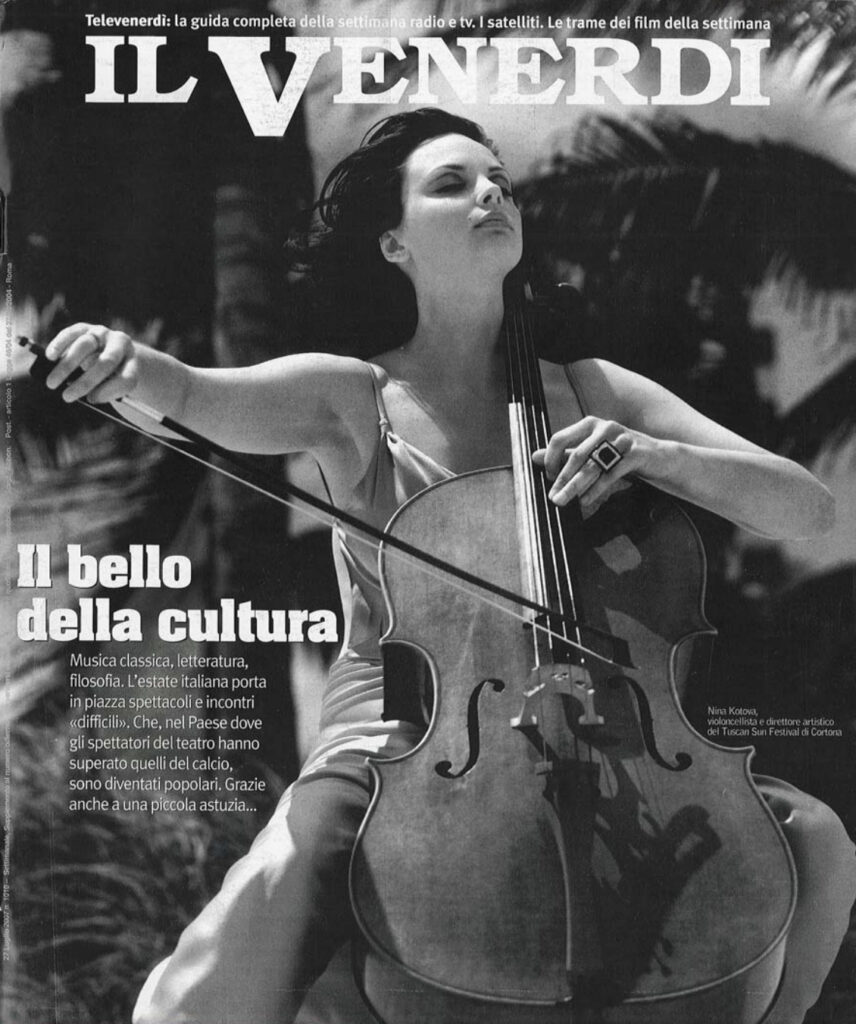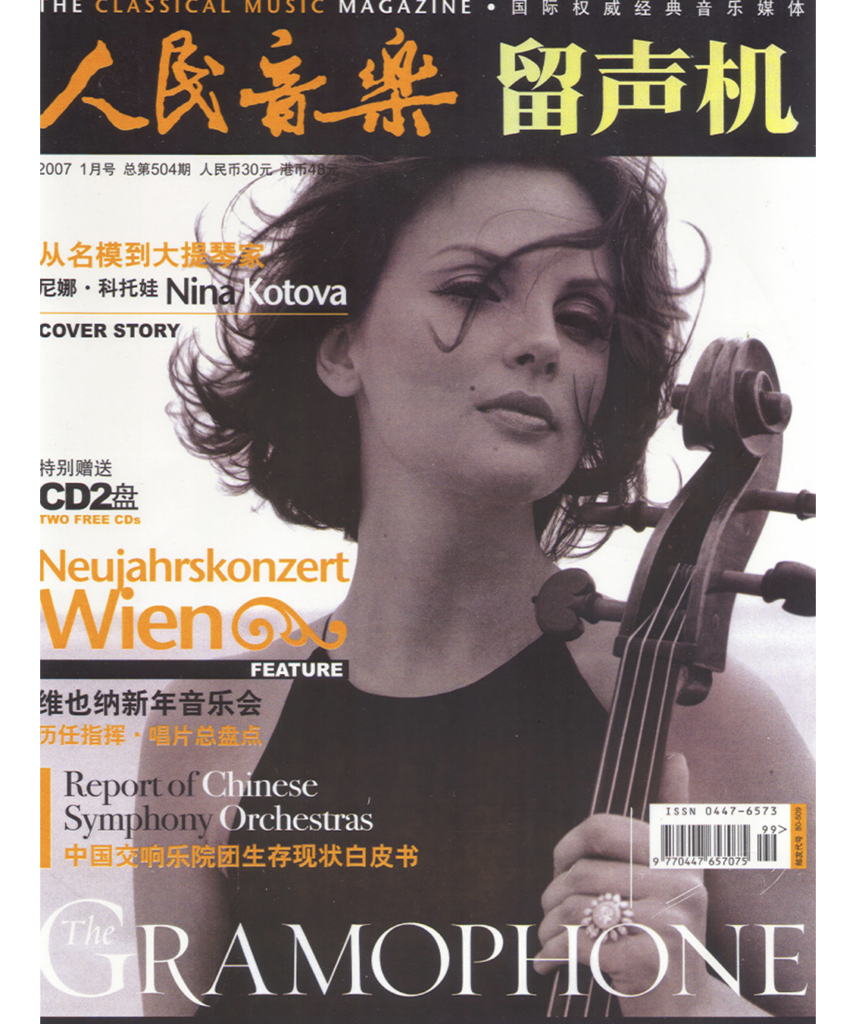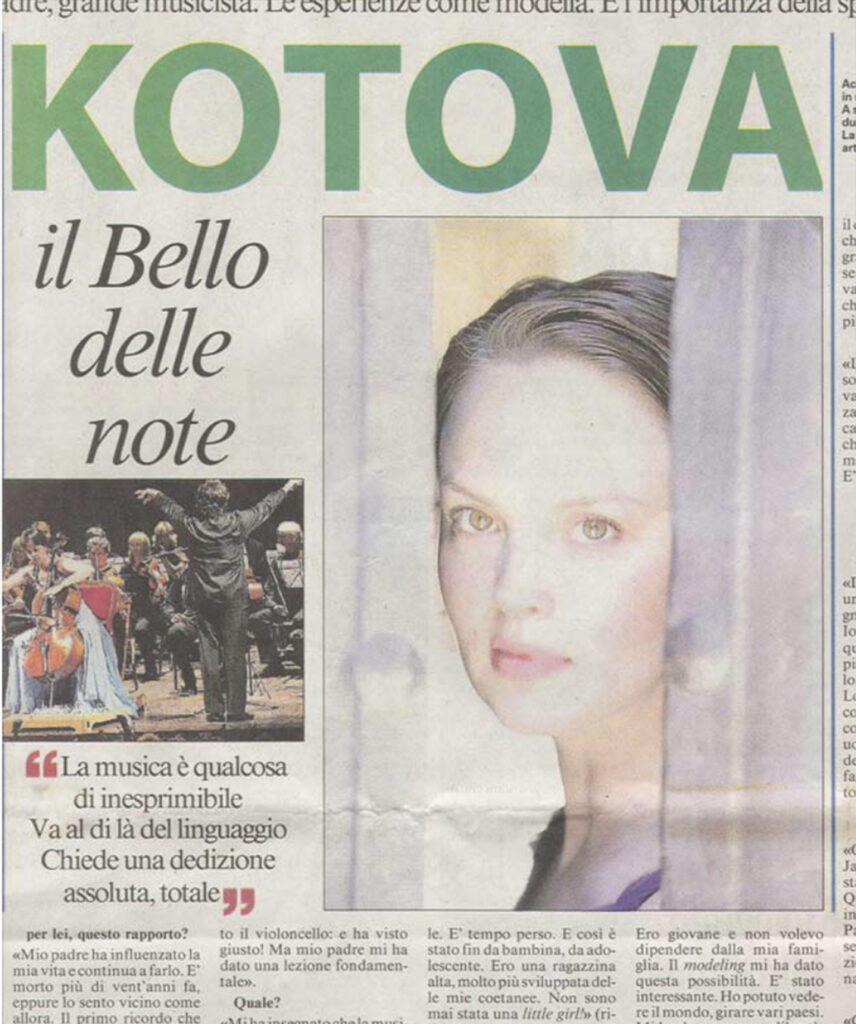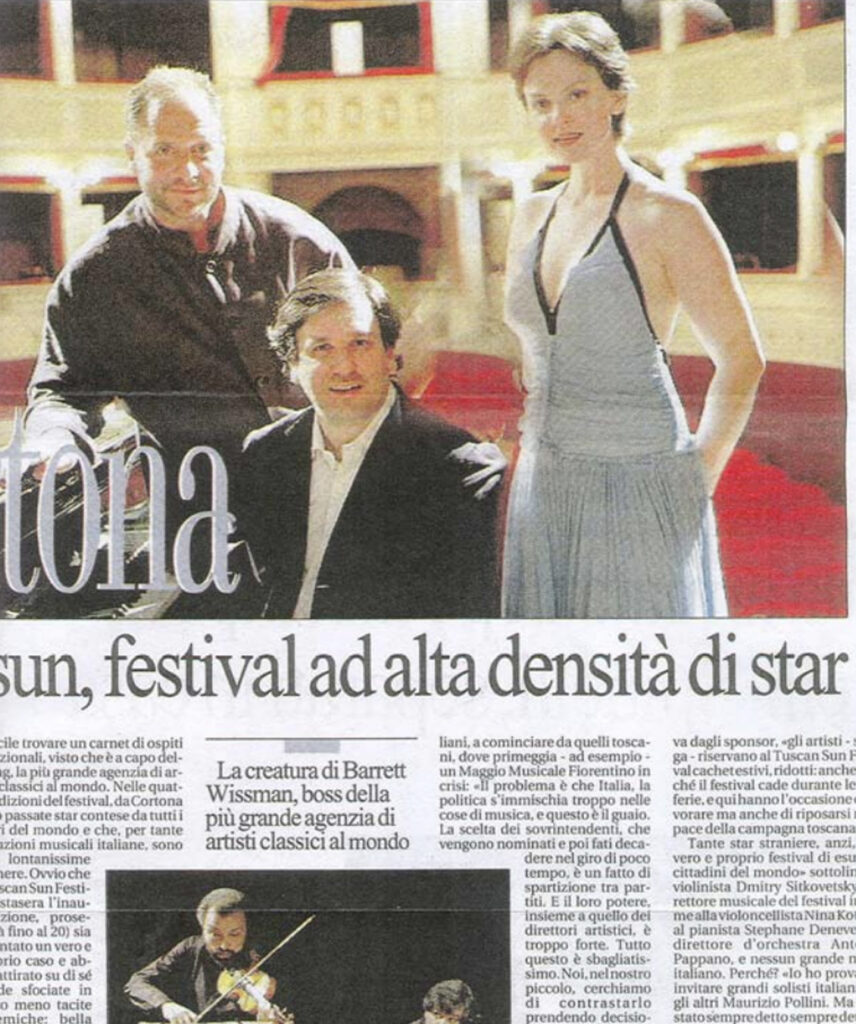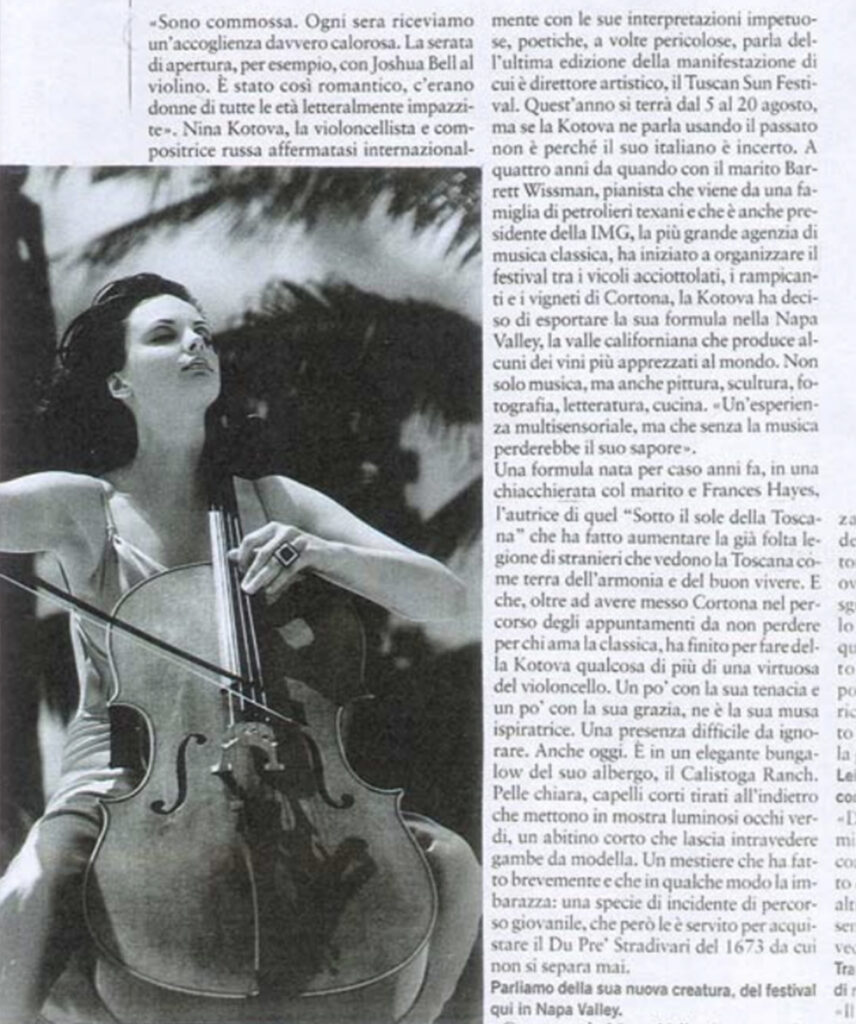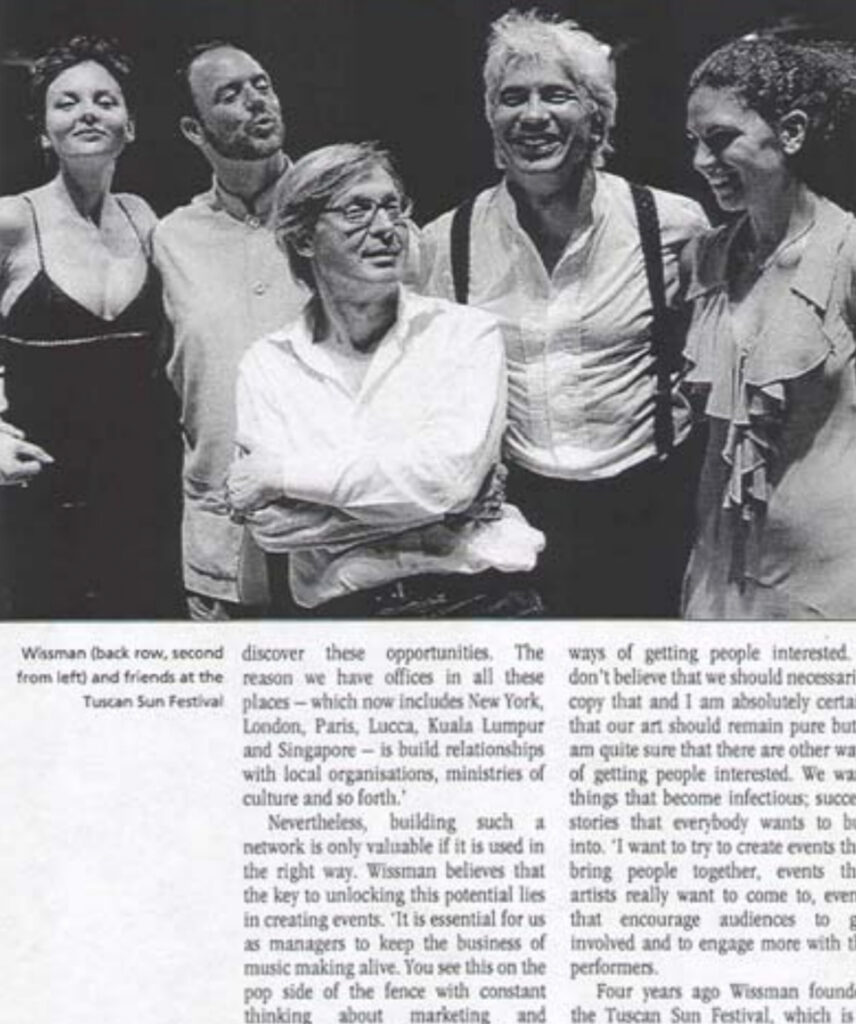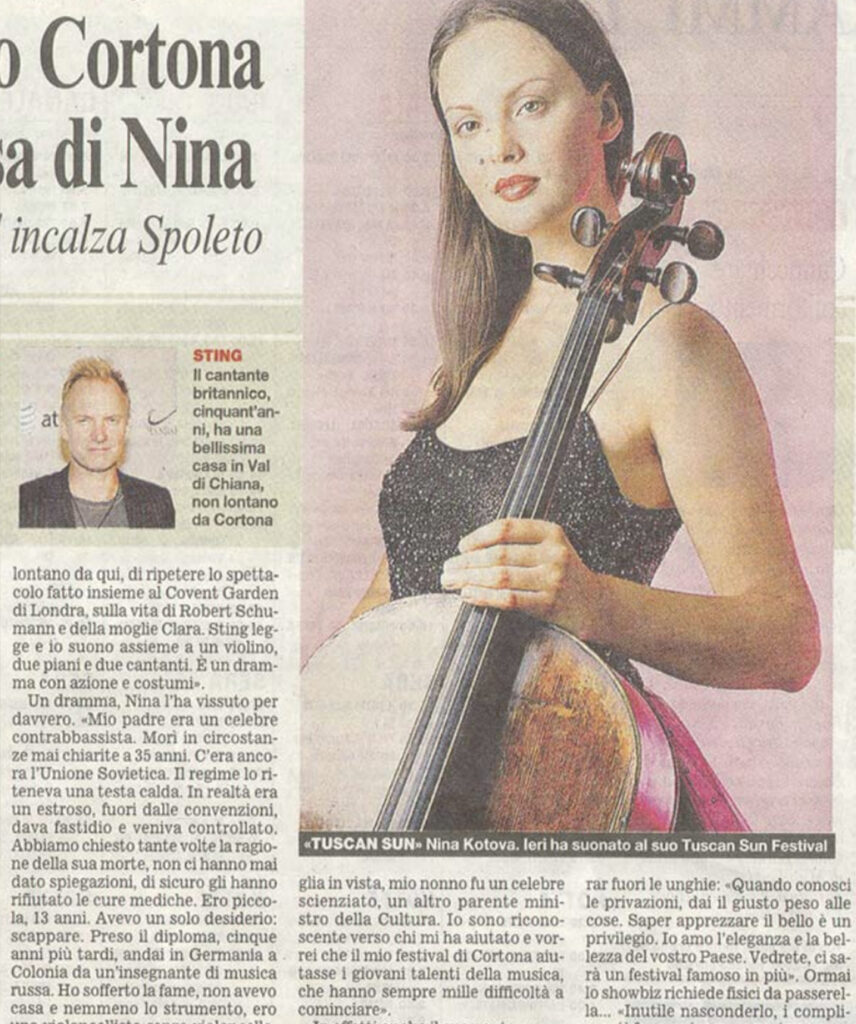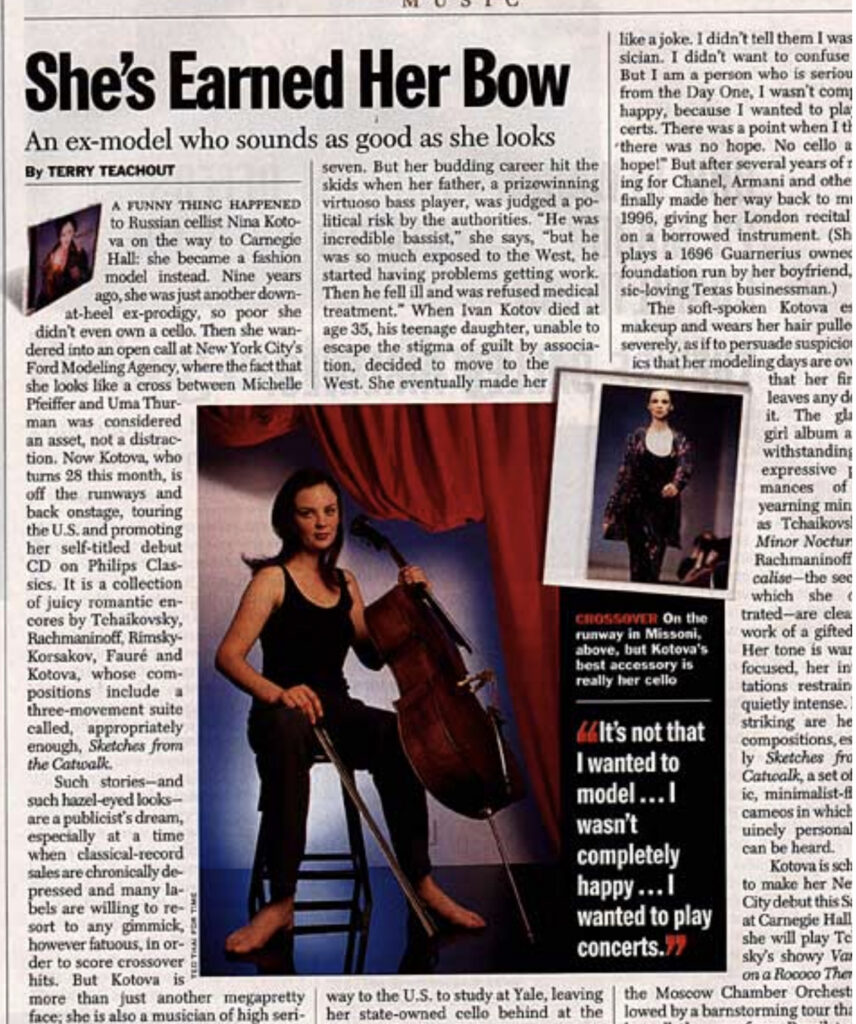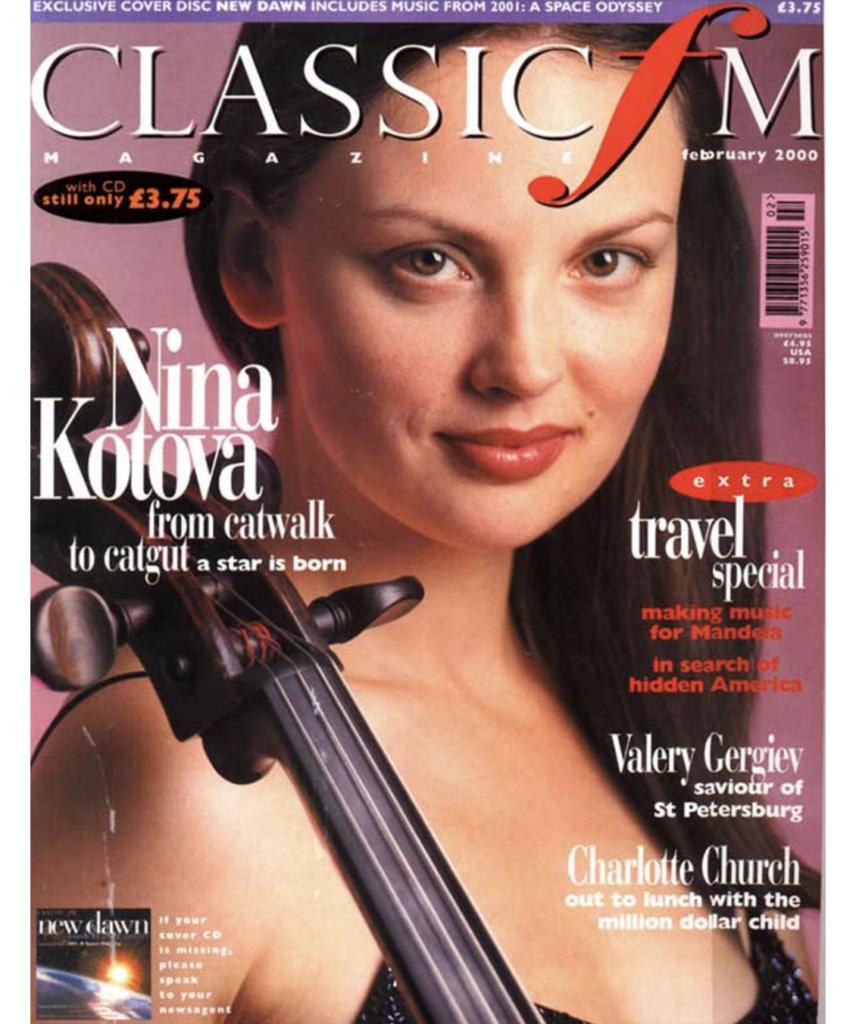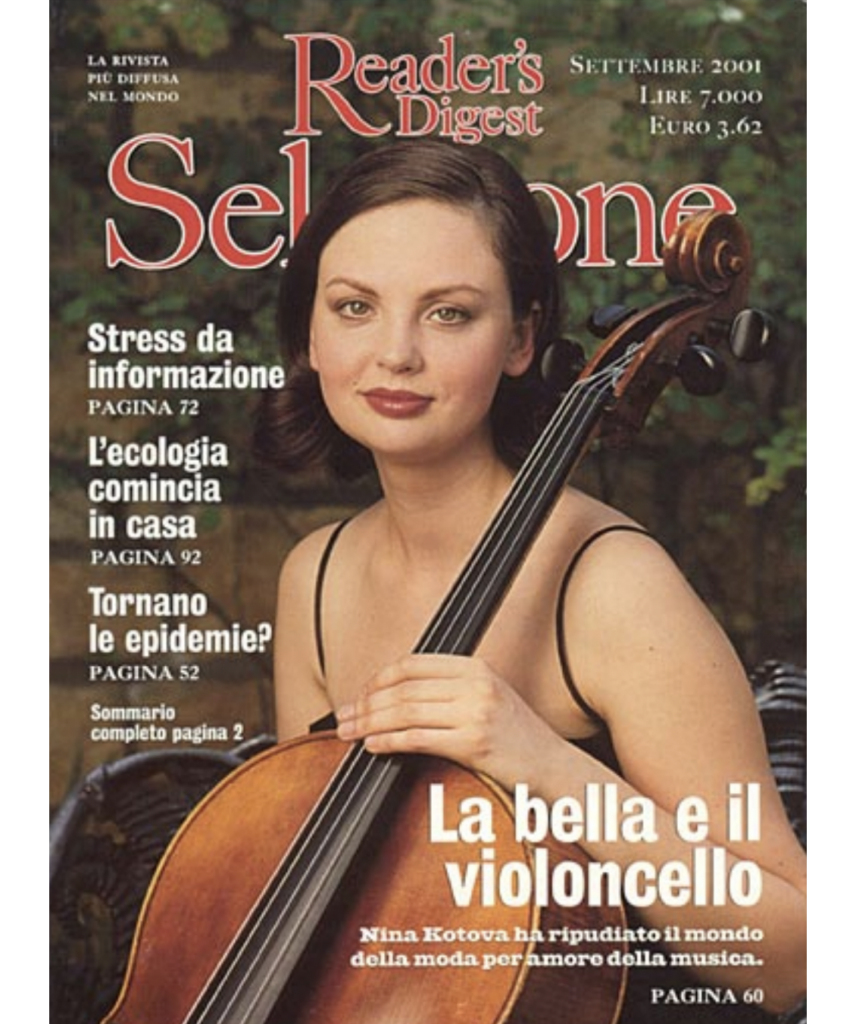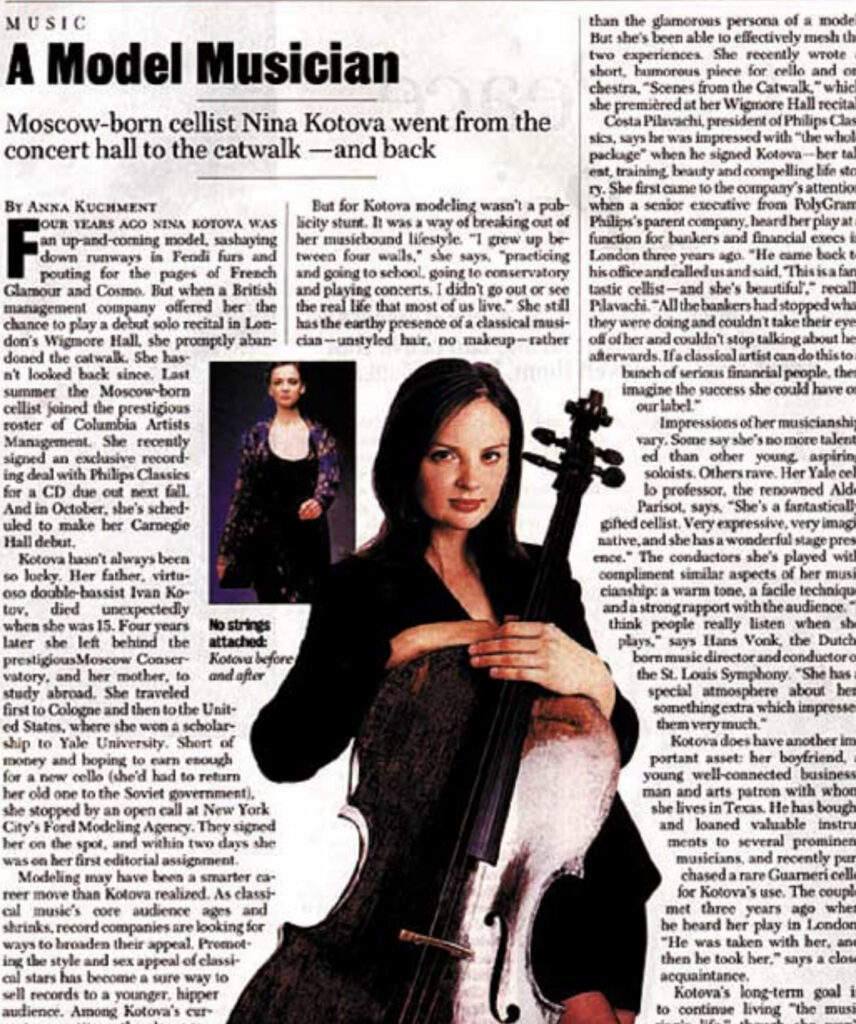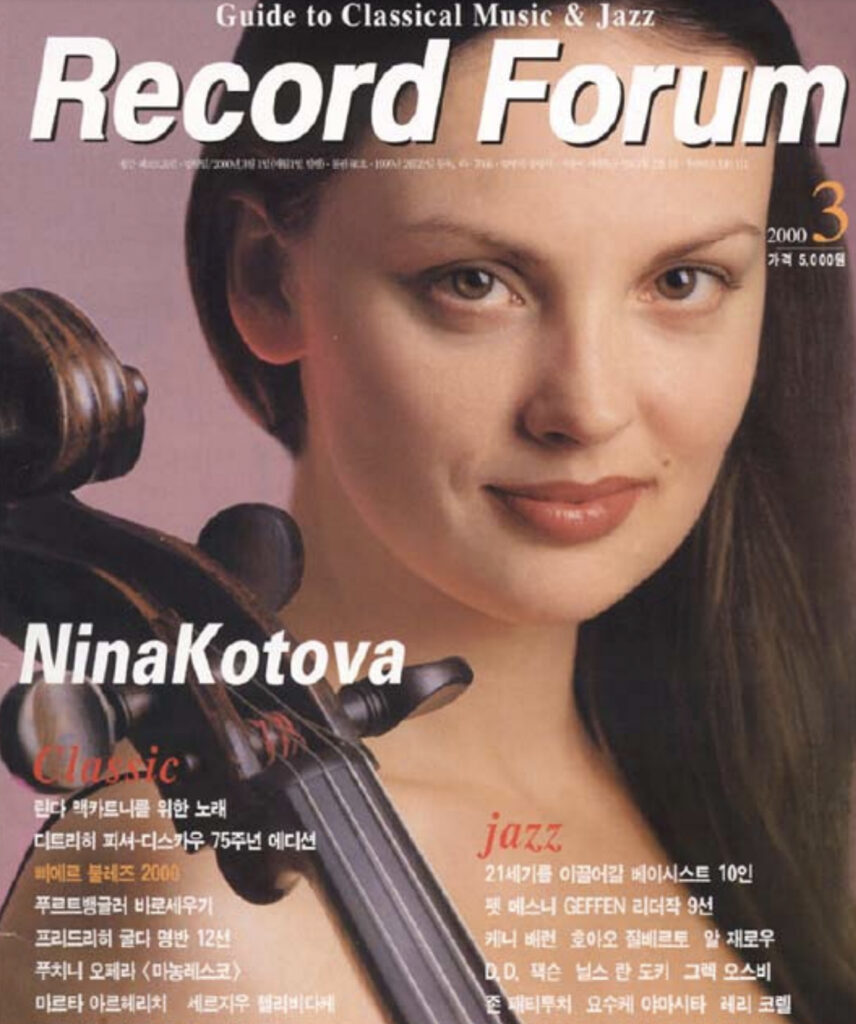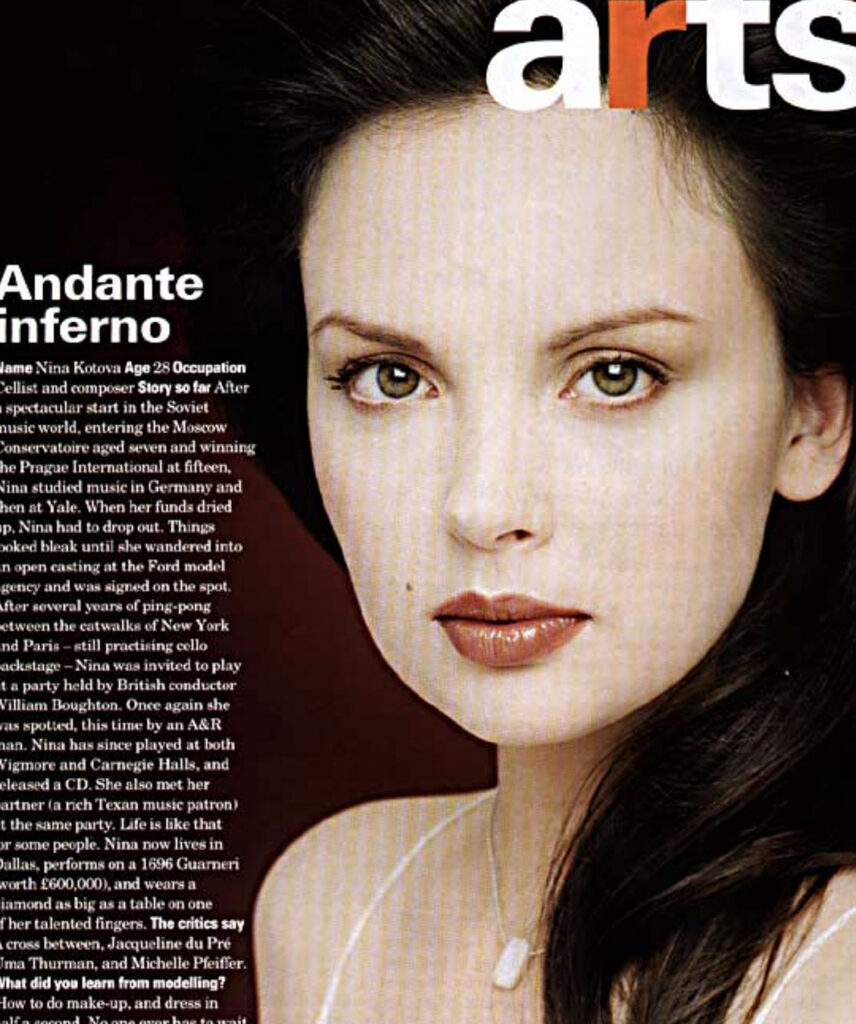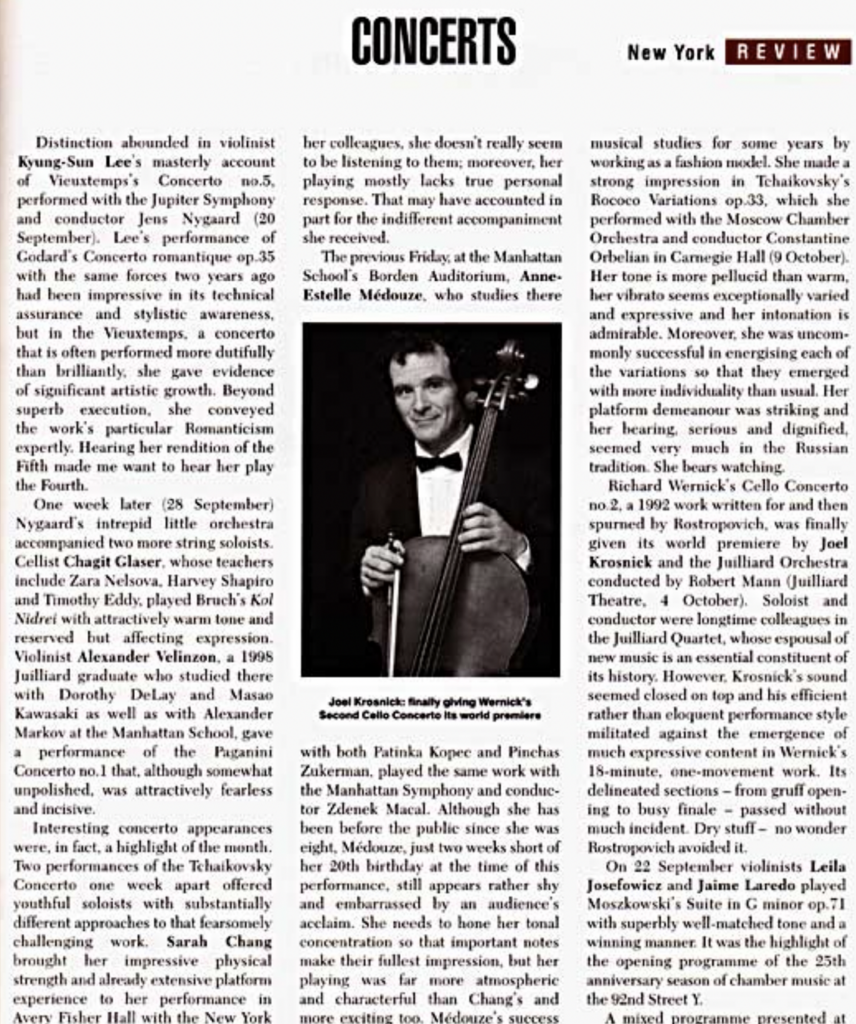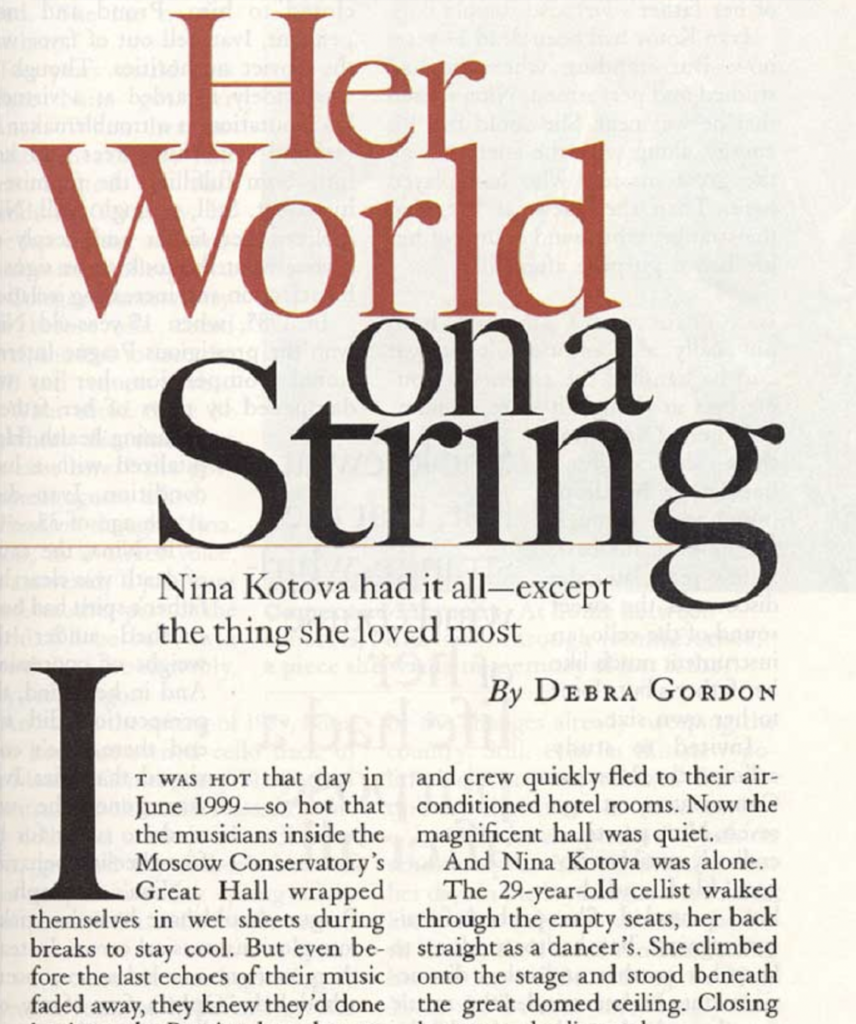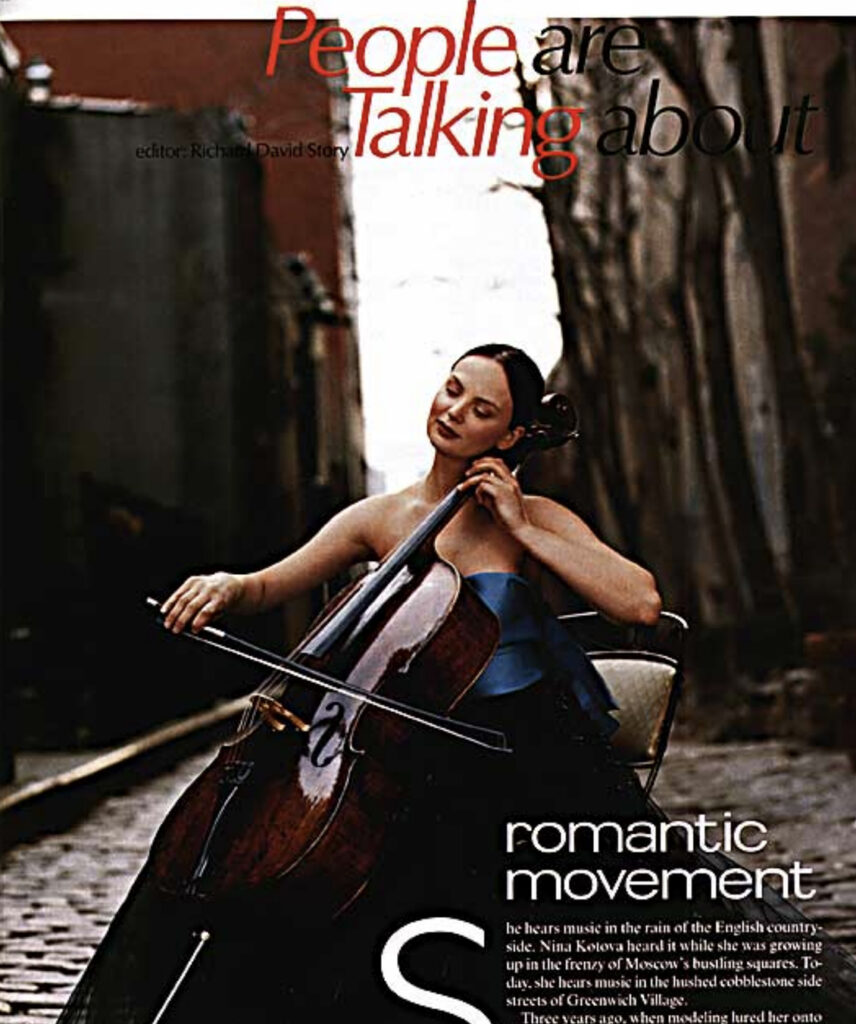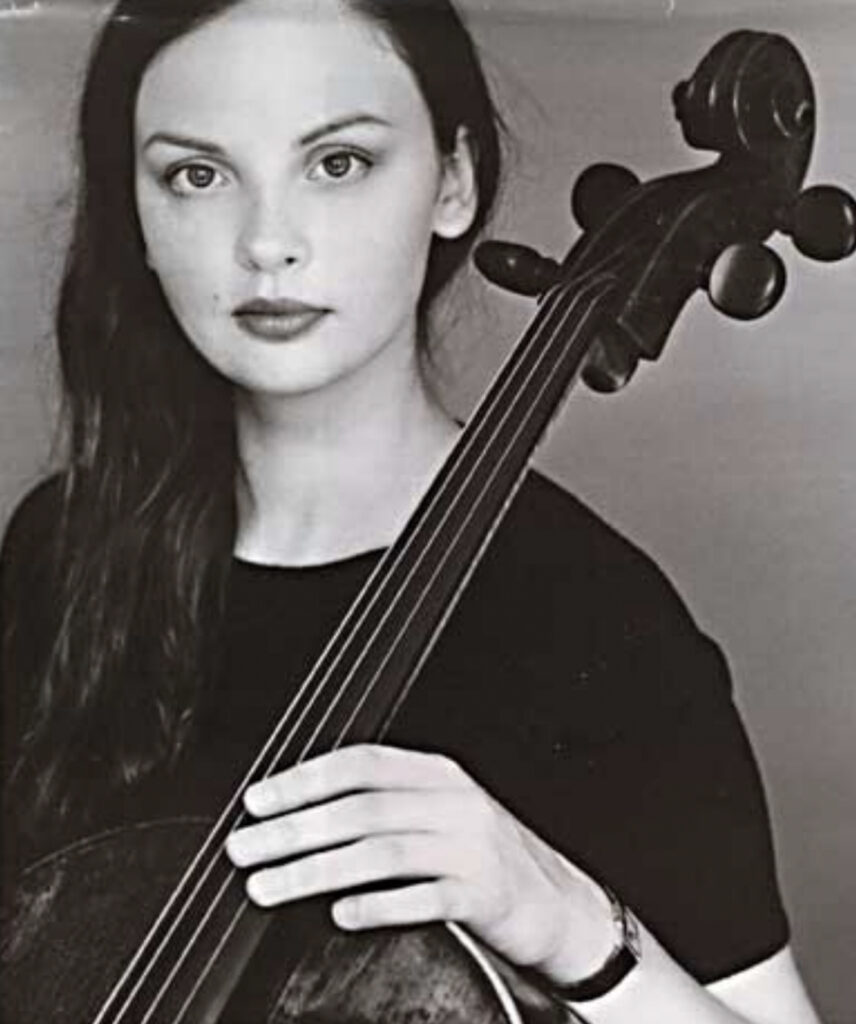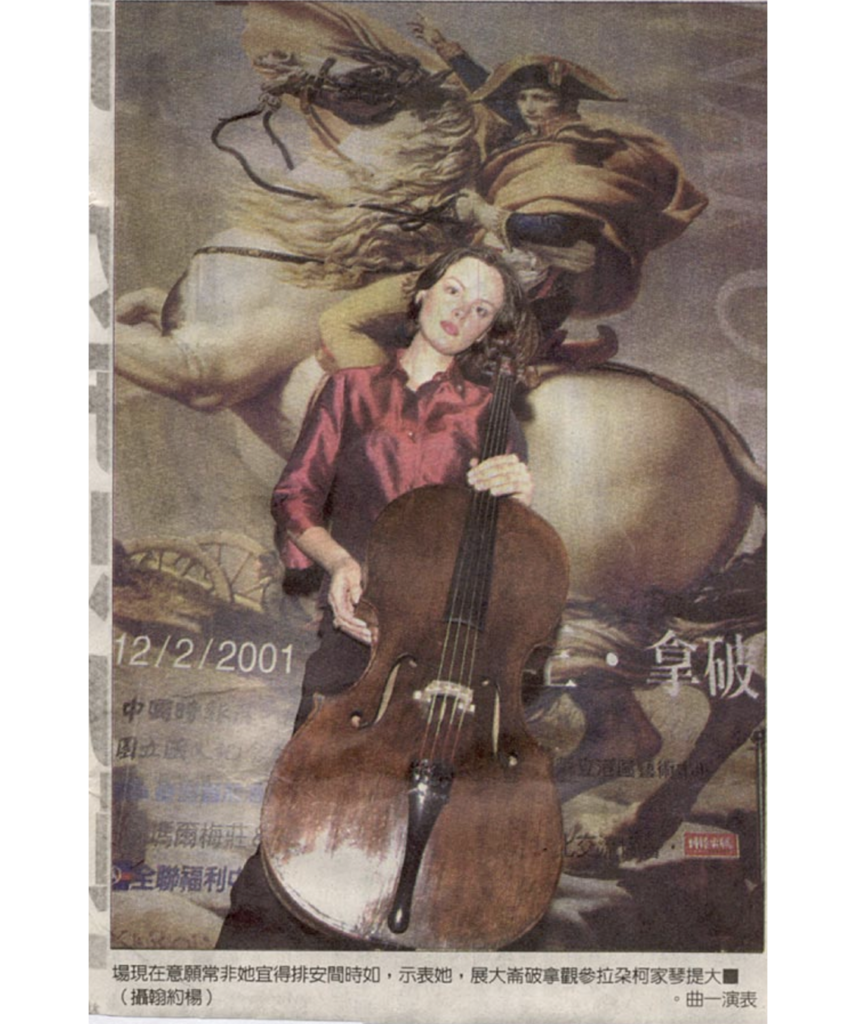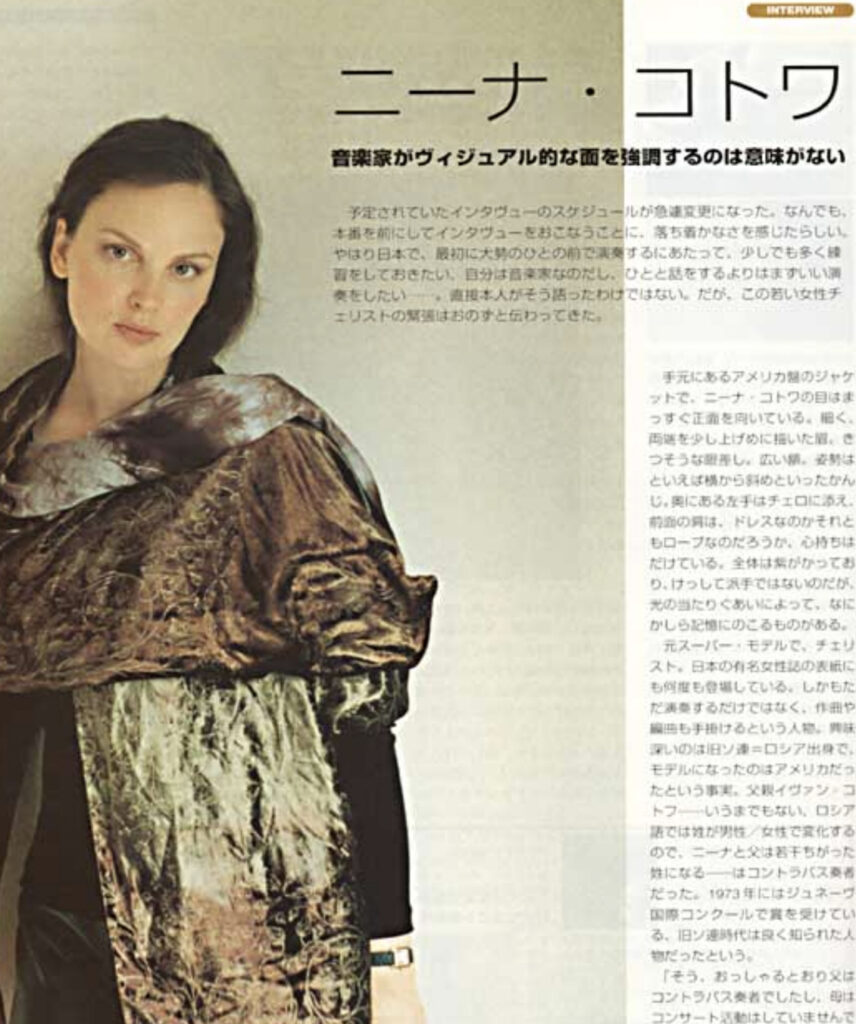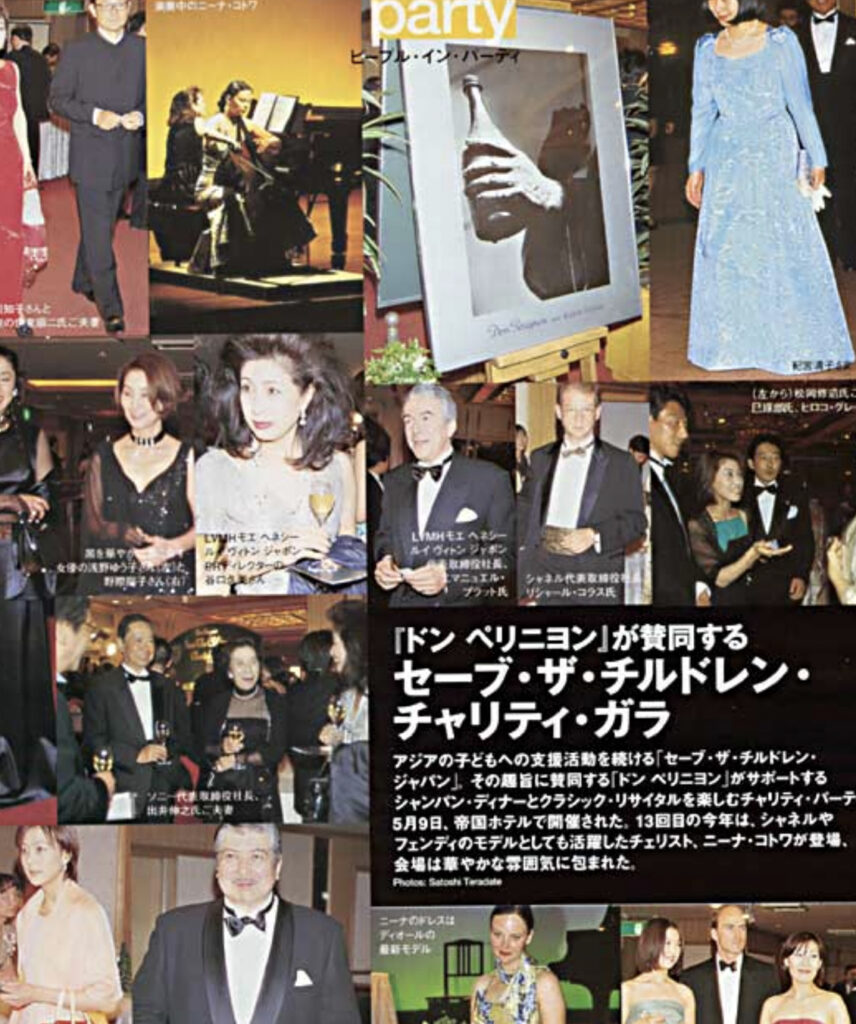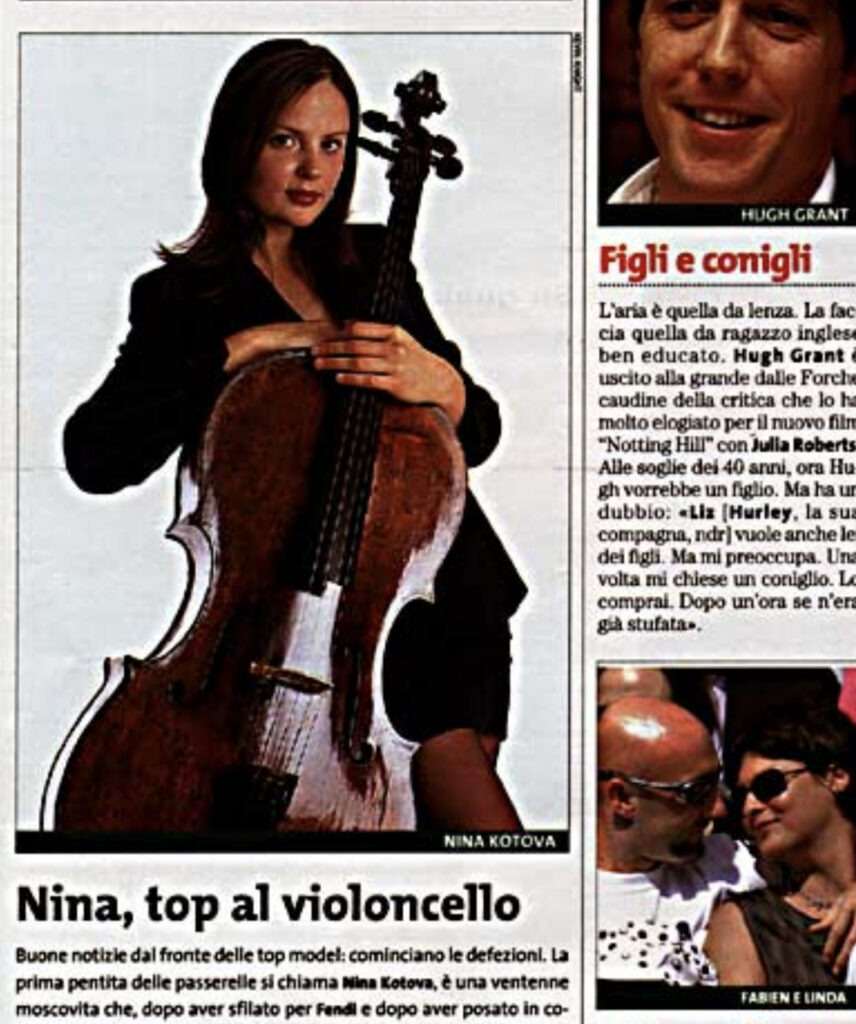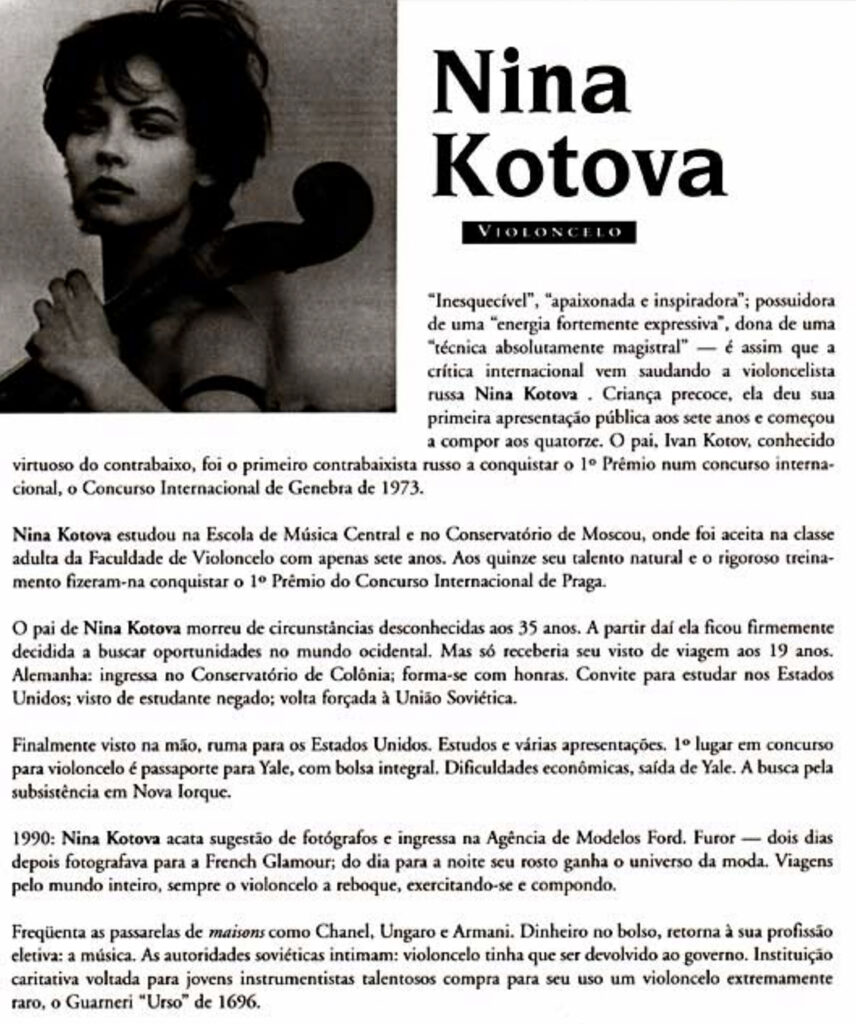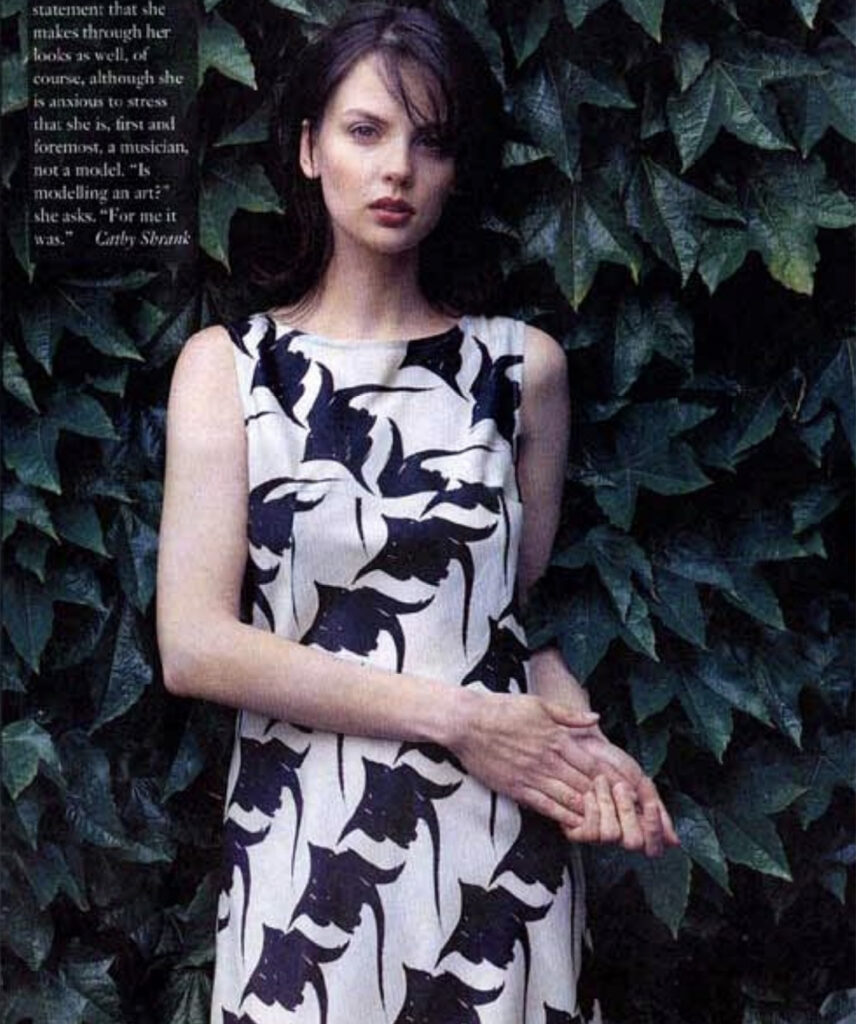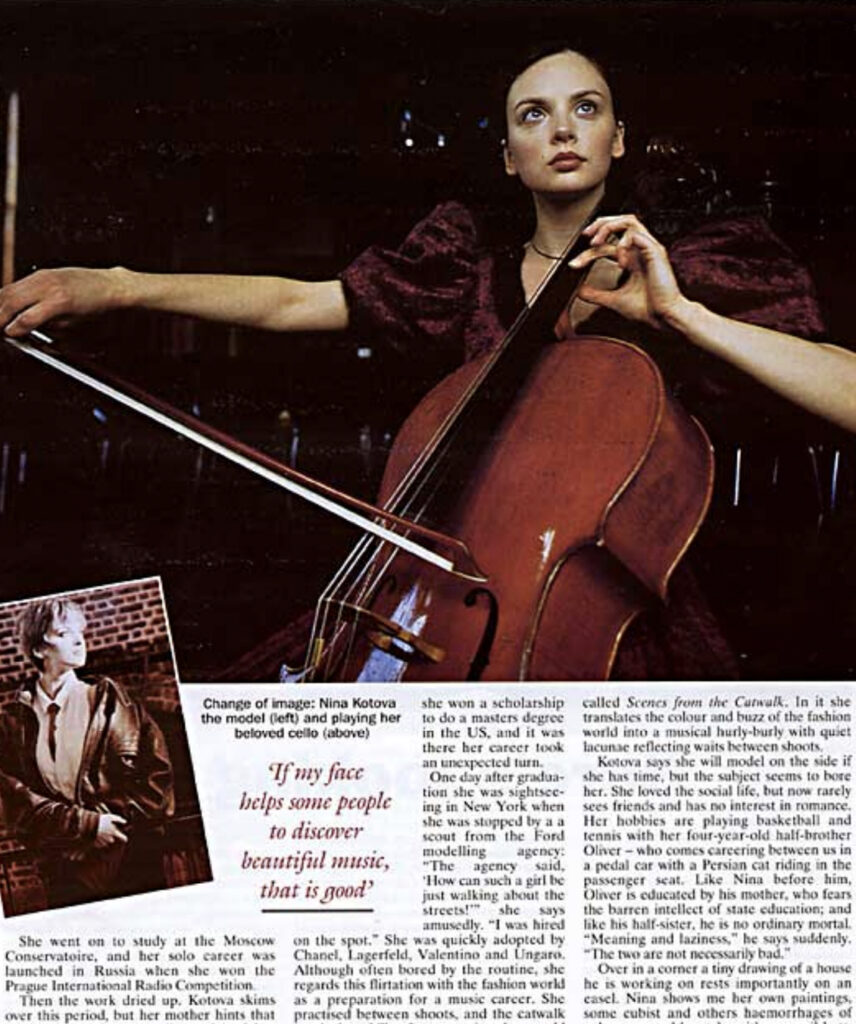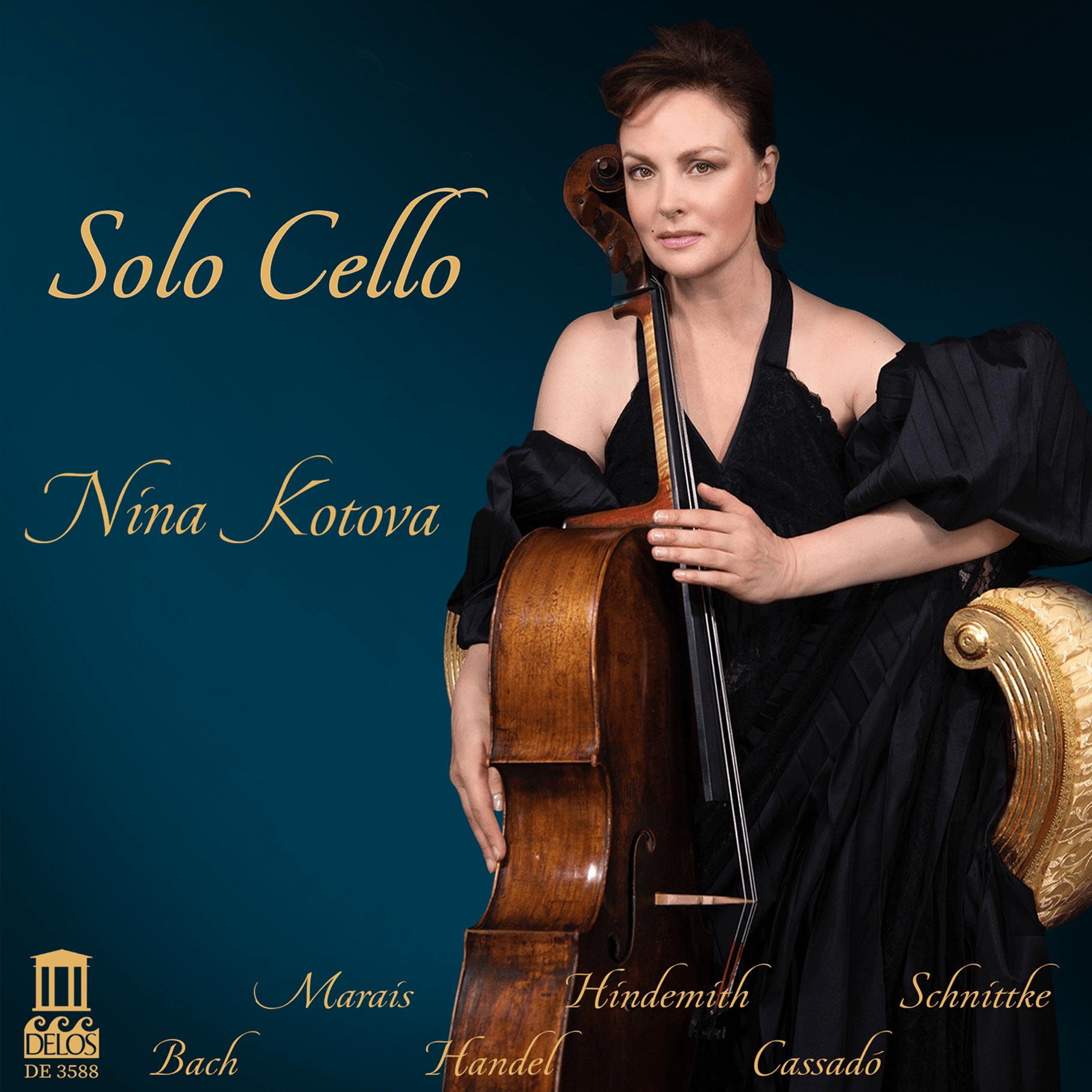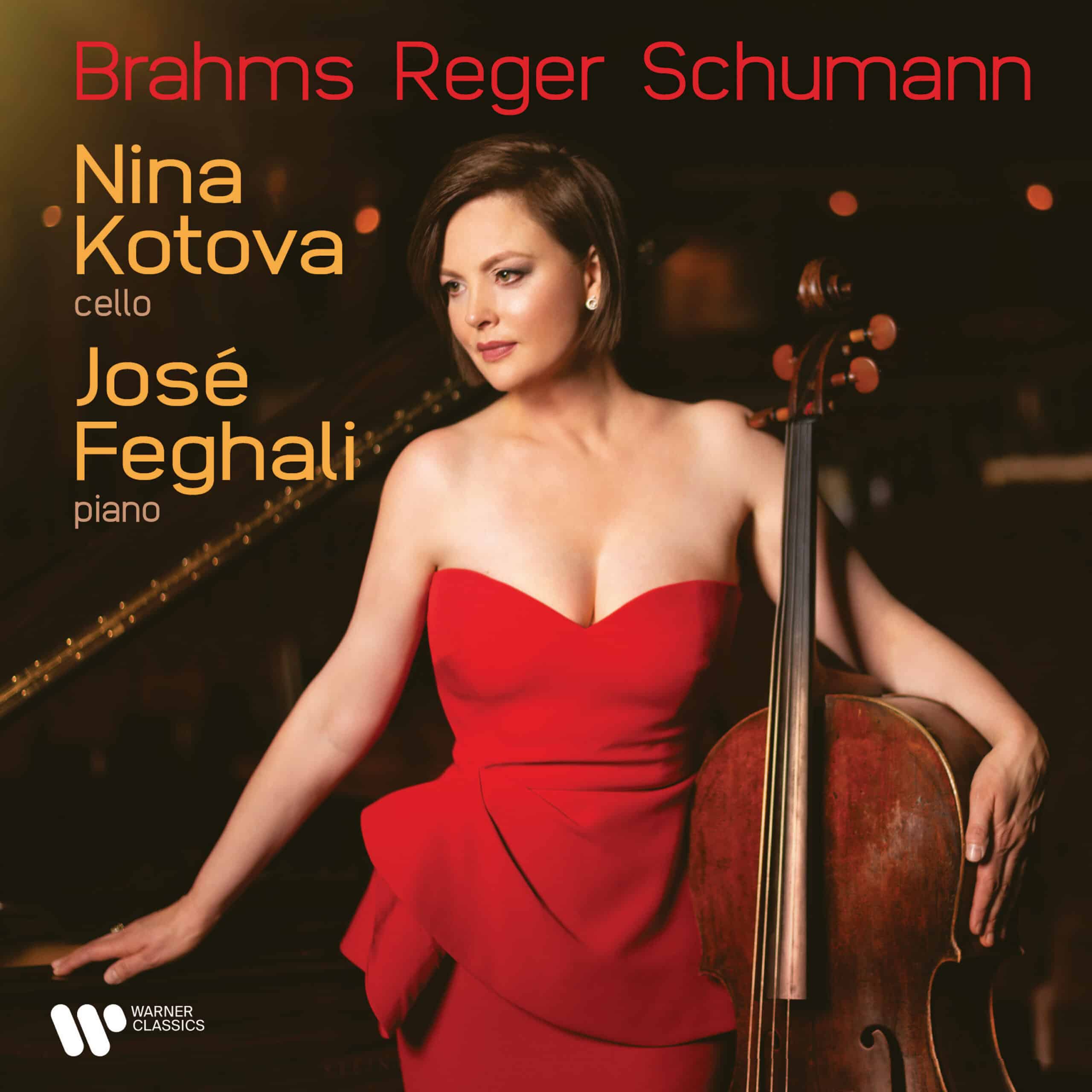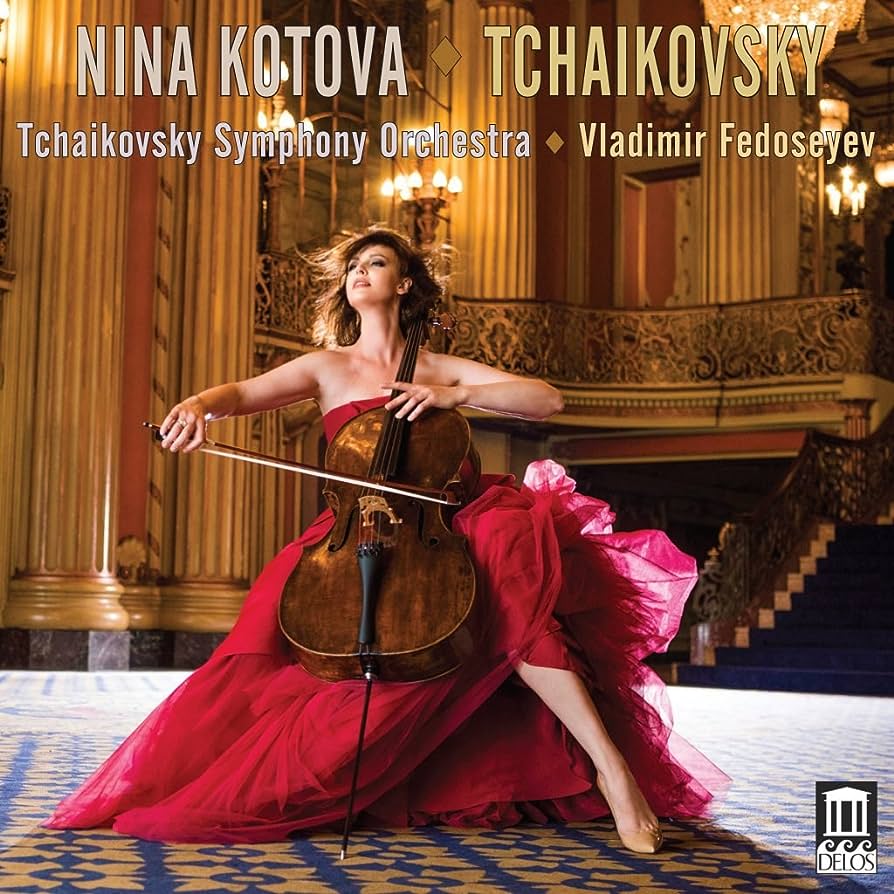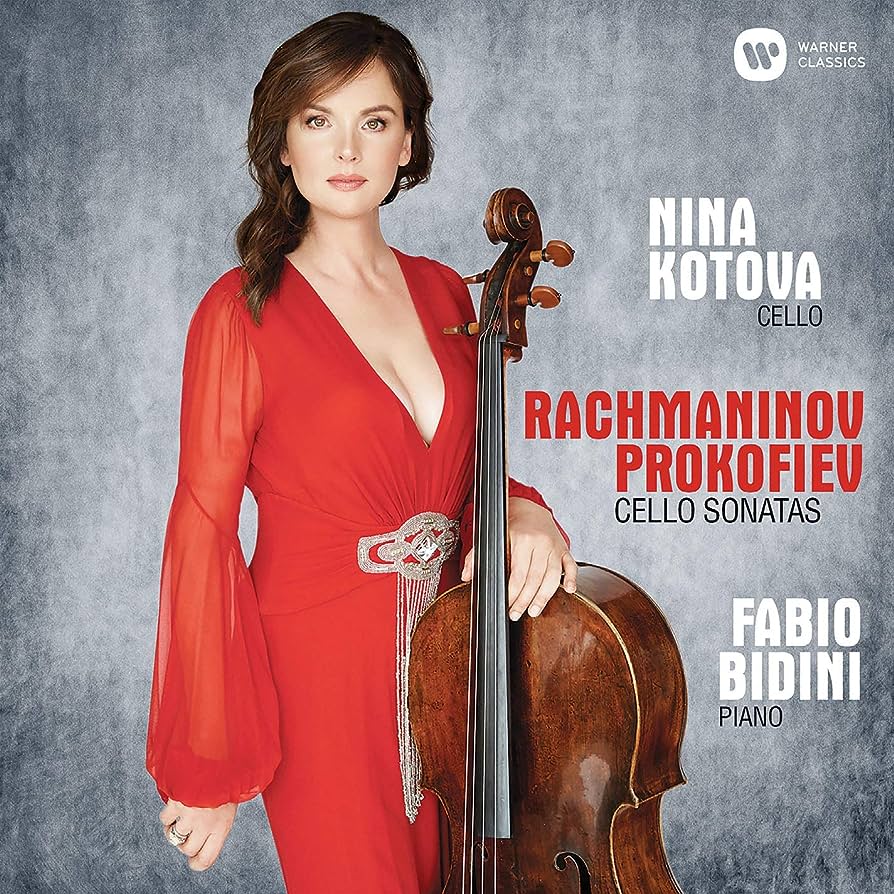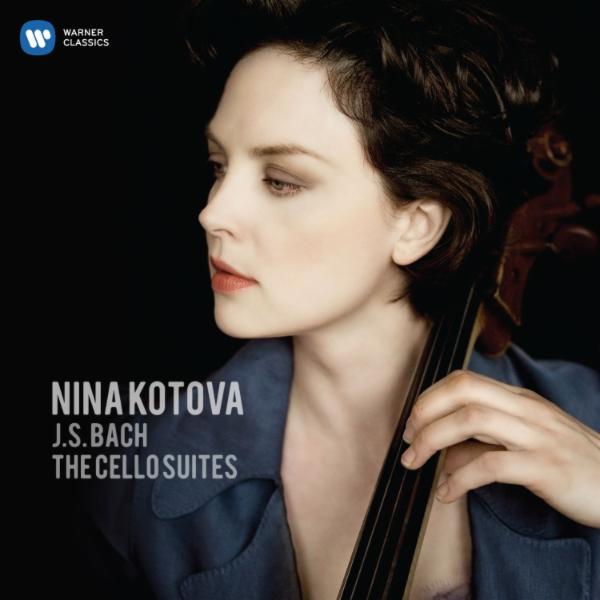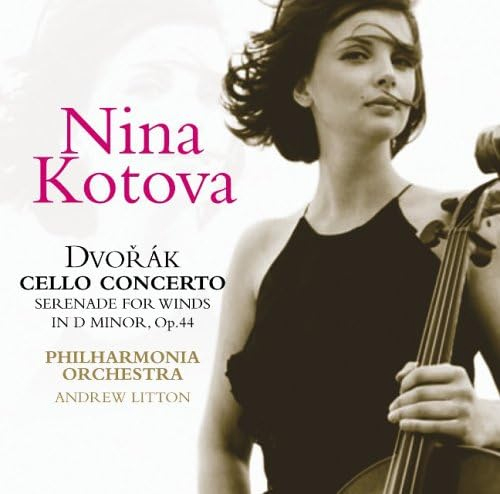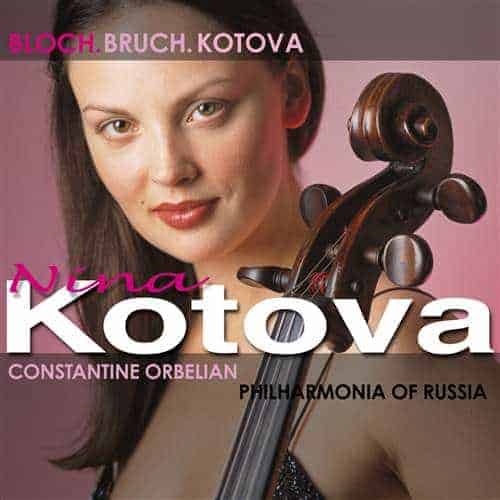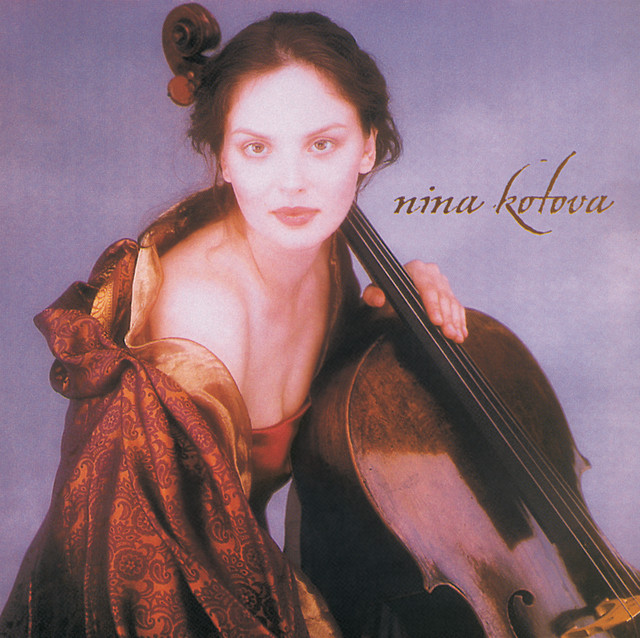“Exhibiting a rare eloquence and above all a suave sensitivity, Nina Kotova, who trained at the prestigious Moscow Conservatory, uses the most subtle methods to present us with a version as sumptuous as it is colorful of this intoxicating work (Tchaikovsky’s Rococo Variations)”
– Utmisol, Performance with Orchestre National du Capitole de Toulouse, September 24, 2022
Solaun and Kotova: Two Geniuses Found. “Irresistible, she plays with the most lyrical singing tone, supported by her overwhelming technique. The Ruggieri cello in Kotova’s hands responds with a sound full of iridescence and nuances”.
– The Opinion of Malaga – Alejandro Fernández - Recital Nina Kotova with pianist Josu de Solaun, Malaga Philharmonic Society, June 27, 2022
“Nina Kotova’s playing of the Beethoven was characterized by both a delicate spirituality in the Andante and an intensity in the Allegro”.
– Codalario – José Antonio Cantón - Nina Kotova with pianist Josu de Solaun, Malaga Philharmonic Society, June 27, 2022
“Her understanding and elucidation of Tchaikovsky is nonpareil, flamboyant yet measured, but still emanating the turbulence of the music’s emotional impact. Her technique is immaculate and, in combination with her intuitive feel for Tchaikovsky, the end result is a confection of pure elegance.”
– HuffPost: “Nina Kotova – Tchaikovsky” – The Dazzling Talent of Nina Kotova – Randy Radic
“Nina Kotova brings a full, rich cantabile to ...Prokofiev’s C major Sonata.”
– Peter Quantrill, The Strad magazine
“… this is a reading with a clear sense of direction, well paced and technically adroit… sensitive…elegant…”
– on Rachmaninov; Prokofiev Cello Sonatas (Gramophone, UK)
“She made a strong impression in Tchaikovsky... Her platform demeanour was striking and her bearing, serious and dignified, seemed very much in the Russian tradition.”
– The Strad (Carnegie Hall Debut)
“One is astonished.. She plays with dark timber, without sacrificing the melodic sound. Kotova’s Bach is profound, substantive, almost furious. Strong recording by a strong woman.”
– WAZ
“Like Rihm in 1974, so Kotova in 2000 stands in defiance of both the emotional austerity of last century’s modernism and the new simplicity of so much recent music. Her Cello Concerto is a complex, gripping affair.”
– San Francisco Chronicle
“…She’s a talent to reckon with – poised, committed, graceful and spirited.”
– Los Angeles Times
“Nina Kotova displays a maturity and tonality that renders her passionate and delicate performance into a technically superior exhibition.”
– Strings
“Kotova, with her rich tone and lovely lyrical playing, almost made the work sound easy. The audience loved the Finale where she, for lack of a better phrase, let it rip.”
– Napa Valley Register
“...it (the cello) rings out in all its lovely brightness in this generous, full-toned recording.”
– Strad
“...Dazzling display of technical skills .. lovely interpretation of Tchaikovsky’s Variations on a Rococo theme.”
– Bristol Post
“She tackles the greatest cello concerto, demonstrating what a strong and individual artist she is.”
– Gramophone
“...awe-inspiring; her playing is nothing short of spectacular.”
– Jamsphere.com
“..her spectacular technique, wide-ranging command of expression, and passionate playing profile, listeners are readily won over.”
– The Herald
“Nina Kotova creates the most compelling cello performance on her latest release of J.S. Bach Suites.”
– Selloutrecords.com
“La Kotova ha dimostrato … saper rendere con morbida e intensa effusione la commossa spiritualità della pagina di Bruch… Esecuzione di rara vibrazione emotiva.”
– Il Messagero
“Music is an inexplicable type of language which requires absolute, total dedication.”
Triumphant bow
“The splendid Russian cellist Kotova brings The Tuscan Sun Festival to California. To make music and interpret works of others is a great responsibility. It requires bravery and imagination.”
“The Tuscan Sun Festival has been so successful that we’ve extended the idea to include Napa Valley in the States that will unite the world’s best and most adventurous music making with the visual, literary and culinary arts.” Photo: Nina Kotova, Barrett Wissman, Vittorio Sgarbi, Dmitry Hvorostovsky, Florence Hvorostovsky
The stars invaded Cortona.
The Russian Revolution of Nina.
“I recognize talent and not the ‘external’ form of expressing it. It is music which brings beauty into this crazy world.”
She’s Earned Her Bow
“Kotova is.. a musician of high seriousness and real talent…her expressive performances of such yearning miniatures as Tchaikovsky’s Nocturne and Rachmaninoff’s Vocalise – the second of which she orchestrated – are clearly the work of a gifted artist. Her tone is warm and focused, her interpretations restrained yet quietly intense. No less striking are her own compositions.”
Cover: Russian Resolut
“Nina dreamt of fame and fortune while growing up in communist Russia. Her determination to succeed has paid off-after triumphant debuts in London and New York, now she is being feted for her virtuosity on the cello.”
“… Last summer the Moscow-born cellist joined the prestigious roster of Columbia Artists Management. She recently signed and exclusive recording deal with Philips Classics for a CD due out next fall. And in October, she’s scheduled to make her Carnegie Hall debut.”
Andante inferno
“So far after a spectacular start in the Soviet music world, entering the Moscow Conservatoire aged seven and winning the Prague International at fifteen, Nina studied music in Germany and then at Yale.”
Concerts, New York Review
“She made a strong impression in Tchaikovsky’s Rococo Variations op. 33. Her platform demeanour was striking and her bearing, serious and dignified, seemed very much in the Russian tradition. She bears watching.” – The Strad (Carnegie Hall performance review)
Her World On A String
“…But even before the last echoes of their music faded away, they knew they’d done justice to the Russian-born beauty who’d come home to record her debut album.”
People are Talking about Romantic Movement
“She hears music in the rain to the English countryside. Nina Kotova heard it while she was growing up in the frenzy of Moscow’s bustling squares. Today, she hears music in the hushed cobblestone side streets of Greenwich Village.”
Nina Kotova, Violoncelo
““Inesquecevel”, “apaixonada e inspiradora”; possuidora de uma “energia fortemente expressive”, dona de uma “tecnica absolutamente magistral” – e assim que a critica internacional vem saudando a violoncelista russa Nina Kotova.”
Sweet Music
“Too good-looking by half to be a classical cellist, let alone an award-winning one…”
Translating Colours Into Sound
“… Already three leading record companies are competing to turn Nina Kotova into the face of their own CDs.”
Featured Reviews
“Charismatic cellist…” – The Philadelphia Inquirer
“…Nina is a musician of high seriousness and real talent…her expressive performances of such yearning miniatures…are clearly the work of a gifted artist…no less striking are her own compositions…in which a genuinely personal voice can be heard.” – TIME
“Theofanidis has written a most welcome addition to the repertoire for the instrument. It is fragmented and unified as well as lyric and angular, all at the same time. The musical language shows its family tree here and there, but all of these parental influences are tossed unceremoniously into the pot and a distinctive voice emerges. Ms. Kotova made an excellent case for the concerto and navigated its many extreme difficulties with verve. The work asks everything possible from the instrument from wide tremolos and blindingly fast passage work to stratospheric trills. She is an exciting player and, draped in sparkling gold, shot off as many fireworks visually as the music did aurally.” – Theater Jones
“…She’s a talent to reckon with – poised, committed, graceful and spirited.” – Los Angeles Times
“Exceptional cellist…an artist of proven technical prowess…and extraverted vigour…thoughtfulness of phraseology.” – The Daily Telegraph
“A great success…remarkable taste…impressive technical and emotional talent” – Culture, Sweden
“…Kotova brought a level of darkness to her sound that made the melodies and mood shifts all the more convincing.” – The Washington Post
“… the depth of feeling and the technical control are never in doubt. The slow movement is improvisatory in its freedom and the finale is fiery and impulsive.” – Gramophone
“…this performance demonstrates that, however distinguished the competition on CD, there is always room for a new interpretation with something distinctive to say. Kotova highlights an appealing trace of inwardness in the opening movement, while the Adagio finds her alternately singing and pleading the solo line. The finale is full of temperament…” – Financial Times
“Nina Kotova, with her bright tone and charmingly impetuous manner, gives an ardent, sensitively phrased account – flexible in tempo, but firmly structured.” – The Sunday Times
“Like Rihm in 1974, so Kotova in 2000 stands in defiance of both the emotional austerity of last century’s modernism and the new simplicity of so much recent music. Her Cello Concerto is a complex, gripping affair. ” – San Francisco Chronicle
“Ms. Kotova’s three-movement concerto.. piquant dissonances and sinuous chromaticism take up where Prokofiev leaves off.” – The Dallas Morning News
San Francisco Chronicle
The Women’s Philharmonic opened its 2000-2001 season Saturday night with a major new work by a young woman destined for greatness.
The world premiere of Nina Kotova’s Cello Concerto, conducted by Apo Hsu with the composer as soloist, was greeted with cheers at Herbst Theatre. It was the heart of an exciting, varied musical evening. Another world premiere, a jazzy fanfare by Margaret Brouwer called “Sizzle,” was paired with Brouwer’s earlier Symphony No. 1. And Kotova returned after her premiere to play Tchaikovsky’s Variations on a Rococo Theme for Cello and Orchestra, a rare and decidedly justified exception to the Women’s Philharmonic’s all-female repertory.
The Kotova Cello Concerto was the main event. It was just a generation ago that another young composer, Wolfgang Rihm, famously proclaimed that “music must be full of emotion, and the emotion full of complexity.” Like Rihm in 1974, so Kotova in 2000 stands in defiance of both the emotional austerity of last century’s modernism and the new simplicity of so much recent music.
Her Cello Concerto is a complex, gripping affair. And there is something else at work in Kotova’s new score: a conflicted, intense love of her Russian roots. There is respect for history in this music.
There is also melancholy. It was clever programming on the part of the Women’s Philharmonic to have Kotova play both her Cello Concerto and the Variations on a Rococo Theme. Tchaikovsky paid tribute to another era in the unmistakable voice of his own. So does Kotova.
Her acid Shostakovian harmonies and surprising Stravinskian rhythms, her shamelessly sweet melodies and downright brutal resolutions all reflect an exile’s undying love for a tragic land. There is nostalgia for the future in this music.
In the opening Allegro moderato, a sardonic trumpet reveille precedes a murmur of strings through which the cello enters as if midphrase. The unusual juxtaposition of cello and brass gives early notice of the composer’s penchant for surprising tonal colors. Her jagged, heart-on-sleeve cadenza demands both superhuman left-finger technique and brave abandon.
Kotova’s playing was reckless, powerful and seductive. Her vibrato was like that of a honeyed contralto with a particularly gutsy lower range. This was crucial, by the way. A lot goes on at once in this concerto, and it is the soloist’s intensely personal virtuosity that holds it together on first impression.
The central Adagio is the most tightly structured movement as well as the most touching. Much of it is a long vocalise for cello, a bittersweet song made edgier by interjections here and there from harpsichord and plucked strings. A rosary of little phrases near the end ushers in the final Allegro, modulating with an insistence Tchaikovsky would have recognized.
The third and last movement is celebratory, firmly tonal and playful. The cello’s intricate melodies seem drenched in dance, with fiendishly intricate scales exploiting the instrument’s full range against a dizzying panorama of orchestral colors.
An oasis of an andante amid all the third movement’s bravura was especially touching. Kotova’s line was luscious, with lush vibrato and an almost vocal use of portamento.
There was serenity, loving patience in the way Kotova took time to let her tone blossom. The harpsichord’s witty interjections emerged like so many sparkles on the broad smile of the cello’s line. The standing ovation was long, the emotional impact longer still. Kudos to the Women’s Philharmonic for bringing to life an important, ravishing score. – Octavio Roca, San Francisco Chronicle
Reviews for Dvorak: Cello Concerto
“..The power of the performance is established in the opening tutti, Andrew Litton drawing passionate playing from the vividly recorded Philharmonia. Kotova proves a reading of extremes, with a greater slowing than usual for the second subject and in the haunting G sharp minor passage of the development section. By contrast, passagework is dispatched impulsively… the depth of feeling and the technical control are never in doubt. The slow movement is improvisatory in its freedom and the finale is fiery and impulsive… Recorded at the Air Lyndhurst Studios in Hampstead, the sound is warm and full.” – Edward Greenfield, The Gramophone May 2006
“..Then, enter the belle of the ball – outstanding Russian cellist Nina Kotova… Her beautiful 43-minute solo treatment of Dvorák’s Cello Concerto oozed sounds of delicacy and finesse – so much so, the stage seemed a little hollow without her after the interval… An outstanding solo performance by cellist Nina Kotova, whose delicate treatment of Dvorak’s cello concerto brought sparkling atmosphere…” – Hull Daily Mail, May 19, 2006
“The young Russian cellist Nina Kotova was an inspired choice of soloist. Technically phenomenal, she combined strong muscularity with glorious lyricism in her compelling interpretation of Dvorák’s Cello Concerto.” – The Scotsman, Edinburgh, Carol Main, May 6, 2006
“Released to coincide with the young Russian cellist’s UK concert tour, this performance demonstrates that, however distinguished the competition on CD, there is always room for a new interpretation with something distinctive to say. Kotova highlights an appealing trace of inwardness in the opening movement, while the Adagio finds her alternately singing and pleading the solo line. The finale is full of temperament..” – Financial Times, Andrew Clark, May 13, 2006
“.. The young Russian cellist Nina Kotova, with her bright tone and charmingly impetuous manner, gives an ardent, sensitively phrased account — flexible in tempo, but firmly structured.” – FT WEEKEND MAGAZINE – Critics’ Choice
“Andrew Litton conducts the Philharmonia Orchestra in a vivacious coupling of Dvorak’s Cello Concerto and the D minor Serenade for Winds. The orchestral quality is sumptuous and warmly defined, matched in the concerto by the heated impetuosity of the Russian cellist Nina Kotova. She brings spontaneity and a sense of danger to the performance which, if occasionally overwrought, is nonetheless compulsive listening.” – Kenneth Walton
“Nina Kotova, with her bright tone and charmingly impetuous manner, gives an ardent, sensitively phrased account — flexible in tempo, but firmly structured.” – The Sunday Times, May 14, 2006 Weekend Magazine – Critics’ Choice
Other Reviews
“Delicato e possente, quel violoncello russo” – Giornale di Sicilia, 2007
“The magnificent concert of Netrebko and her compatriots… Nina Kotova is the cellist of value, deserving the inheritance from the great Rostropovich: her execution of the concerto in B minore ,op.104 by Antonin Dvorak, which represents a milestone of the American period of the Czech composer, was filled with excitement, poetic tessitura tinted with melancholy.” – la Repubblica
“A wonderful and rare performance at Carnegie’s Zankel Hall… The Haydn C Major Cello Concerto with cellist Nina Kotova bespoke authenticity but avoided the ordinary. The new work, another Cello Concerto Cello in C Major by Nina Kotova was substantial in its composition and impressive in its performance. The work subtitled “The Tuscan,” included narration by Frances Mayes connected when they discovered they were neighbors in Tuscany, and both now serve as artistic directors of the Tuscan Sun Festival in Cortona, Italy. In Kotova’s concerto, we had an opportunity to hear Frances Mayes of the gentle book rather than the Hollywood version of her. And there were even some exquisite slides of the Tuscan landscape sparingly and artfully flashed on a screen above the orchestra at just the right moment.” – Lucy Miller, New York Concert Review
“The Artistic Director of the festival, cellist Nina Kotova, was featured in the double role of composer and soloist… Kotova’s dual talents are well known from the recording of her first Cello Concerto (2000).. In her program note, Kotova writes that “The idea of writing the ‘Tuscan’ Concerto came to me after experiencing the fascination and beauty of Tuscany and, in particular, the special light that seems to surround it…Kotova the composer gave Kotova the cellist no slack. The music is tonal with idiomatic scoring for strings and some breathtaking writing for the soloist including a wide catalog of different pizzicatos, fast high exposed notes, tricky harmonics, etc. From front row center, her flawless intonation and smooth, seemingly effortless control were believable only because they were seen as well as heard. This fine concerto can stand alone on its musical quality.” – William Thomas Walker, Classical Voice of North Carolina, Wake Forest University’s Secrest Series: En famille Under the Tuscan Sun
“Ms. Kotova’s 20-minute-long, three-movement concerto.. piquant dissonances and sinuous chromaticism take up where Prokofiev leaves off, though maybe there’s a scorching Italian sirocco in the strings’ tart high chords.” – Scott Cantrell, The Dallas Morning News
“.. Kotova’s creative voice came through in her “Lyrica” Suite,a group of five settings for soprano and cello of the Russian poet Andrei Bely… impassioned oratory with two performers joining forces in a heightened blend of dissonance and shapely phrases.” – San Francisco Chronicle, 2006
“Standing ovations, a stellar guest soloist and sterling interpretations of masterworks marked the season…World-renowned cellist Nina Kotova earned standing ovations for her sensitive and passionate interpretation of Joseph Haydn’s “Concerto in C Minor… The glamourous Russian-born prodigy.. wowed the crowd with her virtuosity… Her 1696 Guarneri “Bear” cello seemed to develop a life of its own, as Kotova played the massive instrument with the facility and ease of a violinist, all the while taking advantage of her cello’s range and depth. A delicacy of touch and a lovely and expressive vibrato combined with seemingly effortless power and passion in a remarkable performance… She earned another standing ovation and a bouquet of flowers for her emotional, melancholy and deeply moving encore… Her star power was evident as symphony fans gathered at intermission to get Kotova to sign programs and her debut CD.” – S. Derrickson Moore, The Las Cruces Sun-News
“Nina Kotova’s interpretation and performance of the Dvorak Cello Concerto was deserving of great merit.” – Il Giornale, Review of Dvorak Concerto with the Verdi Orchestra of Milan
“It takes a lot of nerve to sandwich your work between the works for cello by such noted composers as Bloch and Bruch… that’s the way Kotova plays them – with passion, with intensity, and with great skill. Her bowing is very powerful, but never overpowering. She seems to celebrate the richness of sound that, under the hands of a fine artist, can be produced on the instrument… we could not have listened to any number of other Russian composers (Peter Illich Tchaikovsky is a prime example) and read any number of works by Russian poets, novelists, and playwrights (another prime example: Anton Chekhov) and not have felt that “svetlaya grust.” And we hear it in Kotova’s concerto… The concerto is a deserving work, one that displays more of itself upon repeated listenings.” – Copley News Service
“Rarely has the deep-throated intensity of the cello’s rarified sound-world been as seductively captured as by Delos’s engineers here. Admittedly, Nina Kotova is recorded way out in front of the orchestra, but given playing of such extraordinary magnetism and intensity, I can’t imagine too many people complaining… Bloch’s Schelomo can, even in the most persuasive of hands, feel decidedly protracted – 20 minutes, no matter how skillfully wrought, is a long time to go without encountering a single truly memorable idea. Yet the emotional thrust of this performance is so unforgettable – the orchestral climaxes at 6:00, 11:00 and 17:30 on wards making an electrifying impact – that my attention was held effortlessly from beginning to end… Kol Nidrei is another piece that meanders along pleasantly enough with no great distinction, although once again Kotova and colleagues make an extremely persuasive case for it, playing with a gentle naturalness of phrase and utterance to make the likes of Rostropovich sound a shade overwrought; it is, after all, a morceau de concert, not a full-blown concerto movement… No less accomplished is Nina Kotova’s own concerto, which synthesises elements of Schnittke, Shostakovich and Kabalevsky into a thoroughly convincing whole. The finale gets underway in the style of Bartók’s Concerto for Orchestra, while even the meditative music-scapes of Kanchelli have a look-in at one point. Everyone responds with alacrity to this exuberantly inventive score.” – The Strad
“It is a long time since instrumental virtuosi were expected to provide much of their own repertoire… It’s good to see that at least one virtuoso cellist is keen to revive the tradition, and if Nina Kotova’s Concerto doesn’t put her alongside Rachmaninov or Paganini, it does provide some very colourful music that admirably suits her qualities as a player – her flexible expressive style, beautiful tone throughout the cello’s range, and an impressively dextrous, confident manner of delivery… The companion works by Bloch and Bruch fare well. One has heard more powerful accounts of Schelomo , but Kotova, advantageously balanced, does not need to project more strongly. Her beautiful, restrained playing in the final major-key section is the most affecting. Here the orchestra produces a lovely rich, soft sound and, throughout, Orbelian directs in a very positive, lively manner.” – Duncan Druce, Gramophone
“Although from Clara Schumann forward we were used to the idea that great pianists could also be attractive women.. Nina Kotova is the most beautiful cellist in the world, and, simply, she is also the finest cellist I have ever heard. She has the rich depth of tone of Starker, the intelligence and variety of phrasing of Rostropovich, and, even when compared to Casals, does not come up short on power of expression. She achieves cantorial sadness and ecstasy in Schelomo and the Prayer equal to anything I have heard in any other recording. Kotova has much richer tone than Neikrug, and so, yes, this is the best Schelomo I’ve ever heard (track 2). Of course, Dolby 5.1 playback certainly helps; while there is no mention of Dolby on the label, in fact the recording will decode nicely on your surround sound player. There is mention in the notes of parallel release of this program on SACD, but for a CD this sound is of demonstration quality throughout… My first reaction to her Cello Concerto.. The second hearing was much more positive as I realised that while the overall large structure of the work may be thin, the small scale drama is interesting enough to carry. On my third hearing I could say I started to enjoy myself (tracks 3 and 4). She knows what she wants to say, and is confident enough not to worry if she needs to make a rough sound to say it. So do not be put off by the princess…And make space next to your Rostropovich and Casals disks.” – Paul Shoemaker, Music Web
“Now Nina Kotova can now claim dual citizenship in the classical music world. The Russian-born Kotova asserts her mastery as cellist and composer on her newly released Delos Records CD “Concerto for Cello and Orchestra,” which features music by Ernest Bloch, Max Bruch and Kotova herself… Thoroughly Russian in character and content, the concerto employs the same kind of broad orchestral palette of Strauss or Elgar, while retaining a healthy measure of brazen modernity… Throughout, Kotova embraces 20th-century neo-tonality, always with a nod to the 19th-century Russian masters she ventures. She is not above a touch of wry humor, as in the middle of the final allegro, with a quirky passage scored for cello and harpsichord. From start to finish, Kotova plays with such unabashed muscularity, connoisseurs will surely compare her with a young Jacqueline du Pre… Classical music fans love to cheer on rising, young musicians who hold the proper respect for tradition, yet strike out on their own untrammeled paths. Kotova is just such an artist, and her new CD offers ample proof.” – Dan Pine, Jewish Journal of Northern California
“Nina Kotova’s career as a cellist-composer, which was profiled in Time and Newsweek a few years ago, seems to have taken off. The latest evidence arrives in this recording… Kotova has a penchant for creating rich, bold and emotive sounds. Her concerto makes for good, challenging and multifaceted music. It balances soloist and orchestra well. It can be viewed as a musical remembrance of her homeland – the homeland, that is, of Shostakovich and Stravinsky, of spicy harmonies, melodic intricacy and rhythmic vigor… The opening movement’s power and reckless abandon gives way to a moody, sparse and sometimes-spooky adagio. The soloist makes the lyrical lines resonate with heart-on-sleeve emotion. The finale spins out one different, note-clogged phrase after another, giving the piece’s conclusion a festive air.” – Ken Keuffel, Winston-Salem Journal
“A probing, lyric curiosity marked Nina Kotova’s recital Monday evening at the Cerritos Center for the Performing Arts. The Russian cellist seems to find the syntax and grammar of music endlessly fascinating, working hard to reveal the expressive life of every phrase, a trait also apparent in the U.S. premiere of a solo cello sonata of her own composition… In her classically ordered sonata, phrases develop by accretion within a fashionably rumpled, chromatically goosed tonal context. Obsessive motivic repetition and expansion make each movement sound like a cadenza for an implied concerto. This is inward music for the most part, but communicably so… She can certainly dig in for gruff vehemence and agile bounce, but she has a penchant for feathery, floating lines where a little inflection goes a long way.” – John Henken, Los Angeles Times
“Kotova’s playing was by turns thoughtful, disciplined and intensely romantic….Kotova’s large capacity for heart and mind was well suited to the works” – Austin American Statesman
“Nina Kotova appeared in Taranto last week to an audience that has heard the top cellists in the world over the last two years. Ms. Kotova was definitely the best of what we have heard. Her tone is beautiful and unique; her technique is masterful. The audience responded in kind to the rapturous performance, demanding three encores, after which Ms. Kotova, obviously exhausted, had to finally retire from the stage.” – Corriere della Sera
“The featured attraction was the Dallas Symphony debut of cellist Nina Kotova…Ms. Kotova, a rising star on the cello,…is clearly a serious performing talent who also composes. Playing Faure’s Elegie and Tchaikovsky’s Variations on a Rococo Theme, Ms. Kotova displayed warmly burnished intonation and supple phrasing, coupling her quiet intensity with a pleasing absence of histrionics. The Elegie…was simple, heartfelt and affecting, dappled with lovely coloration.” – Dallas Morning News
“Kotova made Boccherini’s music seem much deeper than its reputation. She applied immense resources of coloration, articulation, dynamic shading and rhythmic flexibility to deliver a performance that was intensely personal, yet tautly disciplined. She projected a richly grained, radiant tone, and she made the lines sing like a human voice with something urgent to say.” – San Antonio Express News
“…Nina is a musician of high seriousness and real talent…her expressive performances of such yearning miniatures…are clearly the work of a gifted artist…no less striking are her own compositions…in which a genuinely personal voice can be heard.” – TIME
“She made a strong impression in Tchaikovsky’s Rococo…Her tone is more pellucid than warm, her vibrato seems exceptionally varied and expressive and her intonation is admirable. Moreover, she was uncommonly successful in energizing each of the variations so that they emerged with more individuality than usual. Her platform demeanour was striking and her bearing, serious and dignified, seemed very much in the Russian tradition. She bears watching.” – The Strad (Carnegie Hall performance review)
“…She’s a talent to reckon with — poised, committed, graceful and spirited.” – Los Angeles Times
“In the middle of the opening Moderato, she and the ensemble produced one of those musical moments that transcend what is on the printed page. Kotova suddenly shifted to a high position and abandoned her vibrato for a moment, and gently sustained the phrase while the orchestra simultaneously dropped to a whisper of sound. The resulting shift of timbre, the elasticity of dynamics and phrasing, was a priceless moment.”
– Santa Barbara News-Press
“…Kotova brought a level of darkness to her sound that made the melodies and mood shifts all the more convincing.” – The Washington Post
“I have had the good fortune to hear several fine cellists on their Wigmore Hall debts, but none has proved so remarkable as Nina Kotova. On 22nd July she gave a recital with Gordon Back in which she revealed a truly glorious tone, strong and even throughout the instrument’s compass, and capable of the widest dynamic range. There was never a trace of the curious, and ugly, nasal quality, which many cellists mysteriously produce and never seem to eradicate; all was wondrously pure and easeful, with left-hand technique of utter mastery. Prokofiev’s demanding Opus 119 Sonata was played with idiomatic flair and appropriate dynamic variety. The U.K. Premiere of a Suite for Unaccompanied Cello by Boris Tchaikovsky revealed some fascinating music, exploring the instrument with ingenuity but sporting a touch of wit as well. It was played with discrimination and flawless technique. A Sonata for Cello and Piano by Kotova herself carried the title “Scenes From the Catwalk”, reminiscent of her highly successful work as a leading international model. There is humour and style in this deftly written piece; a most enjoyable affair. Nevertheless, the evening’s crowning wonder came in a superlative account of Rachmaninov’s great Opus 19 Sonata for Cello and Piano. The sweeping melodic lines of this moving work were projected with unforgettable eloquence. I can only hope that this exceptional artist will return to the Wigmore Hall very soon. When she does so the queue for tickets should extend beyond Orchard Street to Oxford Street.” – Musical Opinion
“The concert given by the New Queen’s Hall Orchestra at the Barbican on 6th October brought a performance of Elgar’s Cello Concerto by Nina Kotova which wholly fulfilled the rich promise of her recent solo recital… She played the work with the rapt introspection which its early interpreters used to bring to it, avoiding metorical statement and substituting profound musing upon life’s inner mysteries. So the first movement wound its pensive way with sure phrasing, subtle nuances and, above all, a sense of spiritual loneliness which was Further deepened by a reading of the Scherzo which presented the music as a series of fleeting, haunting shadows. The noble Adagio was rightly seen as the heart of the work, but Elgar’s heart-rending melodic line was allowed to make its impact through the most exquisite shadings and without any heaviness of emphasis. The finale gathered up the threads of this finely spun tapestry to conclude a performance, which drew the instant applause of the Orchestra and the warmest of ovations from a rapt audience. The Elgar was unforgettable.” – Musical Opinion
“Cellist Nina Kotova is a young star with an inner light in her virtuoso performance.” – Versohnung, Germany
“Passionate and inspiring. Close to perfection.” – Culture, Finland
“Sensation of the evening…She has a unique musical language and the power of expressive energy.” – Italy
“A great success…remarkable taste…impressive technical and emotional talent” – Culture, Sweden
“Exceptional cellist…an artist of proven technical prowess…and extraverted vigour…thoughtfulness of phraseology.” – The Daily Telegraph
“UK debut is another string to Nina’s bow” – Evening Standard
“Nina translates colours into sound…A meeting with this rarified figure is as extraordinary as her career.” – The European
“An extraordinary and talented cellist…Nina says so long Chanel” – Daily Mail
“An award-winning cellist who is a walking blueprint for a heroine in an intense romantic novel… Expressing herself is something of a recurring motif…music, painting or modeling…she has the natural urge to explore, which is extremely important to any artist.” – The Sunday Telegraph
“It is not every day that the Wigmore Hall has a top fashion model on stage” – Classical Music
“As comfortable with her Chanel as with her cello.” – Classic fM
“Masterly cello playing in a Scottish debut…” – Evening Times
“A lot goes for her…a deep throaty tone in the bass, tender and lyrical on the top register…Nina plays with soul in a private communion with the instrument…she performs massive programs with meaty works…” – The Herald Tribune
“When she does return to The Wigmore Hall, the queue for tickets should extend beyond Orchard Street to Oxford Street.” – Musical Opinion
“The Elgar (Barbican) was unforgettable” – Musical Opinion

